
READER’S DIGEST | SMALL AND PERFECTLY INFORMED | JANUARY 2018 HEALTH • MONEY • TRAVEL • RECIPES • FASHION • TECHNOLOGY JANUARY 2018 £3.79 readersdigest.co.uk JANUARY 2018
PAGE 68 PAGE 80
PAGE 30
WIN£1,000! SEEPAGE76
“Music Was My Salvation” Bill Bailey:
Ways To Increase Your Popularity 8
Britain’s Beautiful Indoor Gardens
I




When you leave a gift in your will to the British Red Cross, we promise to make sure your legacy lives on.


Find out how you can make or update your will using our free no-obligation will writing service – call 0300 500 0401 or visit redcross.org.uk/freewill


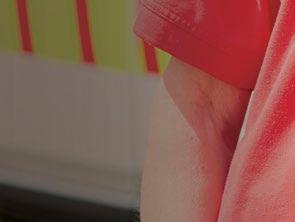



PROMISE I WILL BE THERE IN AN EMERGENCY, NO MATTER HOW BIG OR SMALL
The British Red Cross Society, incorporated by Royal Charter 1908, is a charity registered in England and Wales (220949), Scotland (SC037738) and Isle of Man (0752).
features
14 IT’S A MANN’S WORLD
Olly Mann is bewildered by “psychological theft”
e ntertainment
22 SIR DAVID JASON INTERVIEW
The actor opens up about his favourite roles
30 “I REMEMBER”: BILL BAILEY
The comedian reminisces about his childhood in the West Country Health
38 NO MORE REGRETS
How changing your thought process can free you from feelings of shame and guilt Inspire
58 LIVING WITH REFUGEES

76 100- WORD -STORY c OM p ETITION
Time is running out! Enter now to be in with a chance of winning £1,000
80 SNA p, c HATTER & p O p
Why cultivating the right kind of popularity might be the key to a longer life
Meet the families opening their homes—and their hearts—to asylum seekers
68 BEST OF BRITISH : INDOOR GARDENS
Forget the winter blues with these colourful indoor sanctuaries
travel & a dventure
89 HONG kONG: 20 YEARS LATER
What’s changed since the territory’s return to China?
102 BIG DOGS & kIDS
Beautiful pictures capture a special relationship
Cover photograph By p al h ansen/getty images 01•2018 | 1
2018
Contents JANUARY
p68 © C lint B udd/fli C kr

HAVE YOU EVER broken a New Year’s resolution?
If you haven’t, I’m in awe of you. If you have, fear not, you’re in good company: 80 per cent of us give up on being virtuous by February. There’s no denying that change is hard, but it’s not impossible. In fact, our health feature explains how you can even change your thought processes, freeing yourself from regrets—whether they pertain to failed resolutions, failed ambitions or even a failed marriage. Turn to p38 to find out more.
Another oft-cited resolution is to give up smoking. While laudable (and essential for good health), did you know that cultivating strong relationships might be just as important for your well-being? Flip to p80 for the full report.
Finally, imagine if your resolution were to welcome a refugee into your home. We meet the families who have done just that on p58. Their stories exemplify humans’ capacity for good—and reading them is a lovely way to begin the year.

| 01•2018 2 IN e V er Y I ssue 7 over to you 10 s ee the World d ifferently e ntertainment 19 January’s cultural highlights Health 48 advice: s usannah h ickling 52 the n utrition Connection 54 Column: d r m ax pemberton Inspire 66 if i r uled the World: twiggy travel & adventure 98 Column: Cathy adams Money 110 Column: a ndy Webb f ood & Drink 114 tasty recipes and ideas from rachel Walker Home & Garden 118 Column: Cassie p ryce technology 120 o lly m ann’s gadgets fashion & Beauty 122 g eorgina yates on how to look your best Books 124 January fiction: James Walton’s recommended reads 129 Books that Changed my life: dame vera lynn f un & Games 130 you Couldn’t m ake it u p 133 Word power 136 Brain teasers 140 l augh! 143 60-s econd stand- u p: tom stade 144 Beat the Cartoonist e DI tor’s letter
Reader’s Digest is published in 27 editions in 11 languages
hicks
fiona
theeditor@readersdigest.co.uk facebook.com/readersdigestuk twitter.com/readersdigestuk

























Books or a new hobby for Christmas?

Choose from Floor or Table models
















Serious Readers is a British company totally dedicated to the purity of light. Our lights o er incredible clarity and brightness, in fact our lights are used by surgeons, forensic scientists and ne art restorers – basically anyone who needs to see clearly and accurately.











● Up to TEN TIMES more light on your page than a traditional 60w lament bulb



Special Offer WORTH £150
Purchase a Serious Light and get a FREE Serious Compact Light worth £150. Quote Promotion Code 5049 when ordering by phone or online.

For advice or to request a brochure Call Free 0800 085 1088 or visit seriousreaders.com/5049 Enjoy them even more with a Serious Readers Light.



Reading is easier and faster



Recommended by over 400 quali ed opticians


Delivered fully assembled


30 DAY RISK FREE HOME TRIAL and 5 YEAR GUARANTEE

EDITOR-IN-CHIEF Fiona Hicks
ASSOCIATE EDITOR Anna Walker
CULTURE
EDITOR Eva Mackevic
All commercial services provided by: SUBSTANTIVE MEDIA LTD 0203 795 8886
ADVERTISING
Mike Allen | mike.allen@readersdigest.co.uk
Kerry Schofield | kerry.schofield@readersdigest.co.uk
Sarah Hughes | sarah.hughes@substantivemedia.com
ART EDITOR Richard Cooke
GENERAL MANAGER Gavin Suen
TRUSTED MEDIA BRANDS INC (USA)
President and Chief Executive Officer
Bonnie Kintzer
Vice President, Chief Operating Officer, International Brian Kennedy
Editor-in-Chief, International Magazines
Raimo Moysa
WE PAY...
£50 for the star letter and £30 for regular letters.
Email readersletters@readers digest.co.uk or go to readers digest.co.uk/contact-us
WE ALSO PAY...
£50 for the true stories, anecdotes, jokes in Laugh! and You Couldn’t Make It Up…, and contributions to end-ofarticle fillers and My Great Escape
Email excerpts@readersdigest.co.uk or go to readersdigest.co.uk/contact-us
SORRY!
We cannot acknowledge or return unpublished items or unsolicited article-length manuscripts. Do not send SAEs. Article-length stories, poetry and cartoons are not requested.
CUSTOMER SERVICES
Contact Customer Services for renewals, gifts, address changes, payments, account information and all other enquiries. Call 0330 333 2220* or email customer_service@readersdigest.co.uk
TALKING MAGAZINES
Reader’s Digest is also available in audio and accessible etext editions from RNIB Newsagent, for blind and partially sighted readers. Call the RNIB Helpline on 0303 123 9999 or visit rnib.org.uk/newsagent
SUBSCRIPTIONS
Visit readersdigest.co.uk or write to: Reader’s Digest, The Maltings, West Street, Bourne, PE10 9PH. UK: £45.48 a year. Republic of Ireland: €61.20 a year. Prices include delivery. For gift subscriptions, contact Customer Services.
4 | 01•2018 *Calls to 03 numbers cost no more than a national rate call to an 01 or 02 number and will be free if you have inclusive minutes from any type of line including mobile, BT or other fixed line PAPER FROM SUSTAINABLE FORESTS. PLEASE RECYCLE © 2017 Vivat Direct Ltd (t/a Reader’s Digest). British Reader’s Digest is published by Vivat Direct Ltd, 57 Margaret Street, London W1W 8SJ. All rights reserved throughout the world. Reproduction in any manner, in whole or part, in English or other languages, is prohibited. Reader’s Digest is a trademark owned and under license from Trusted Media Brands, Inc, and is registered with the United States Patent and Trademark Office. All rights reserved. Printed by Pindar Scarborough Limited. Newstrade distribution by Seymour Distribution Limited. SMALL PRINT: Ensure submissions are not previously published. Include your name, email, address and daytime phone number with all correspondence. We may edit letters and use them in all print and electronic media. Contributions used become world copyright of Vivat Direct Ltd (t/a Reader’s Digest). Reader’s Digest is a member of the Independent Press Standards Organisation (which regulates the UK’s magazine and newspaper industry). We abide by the Editors’ Code of Practice and are committed to upholding the highest standards of journalism. If you think that we have not met those standards, please contact 0203 289 0940. If we are unable to resolve your complaint, or if you would like more information about IPSO or the Editors’ Code, contact IPSO on 0300 123 2220 or visit ipso.co.uk
WRITE TO US! SEND US YOUR STORIES, JOKES AND LETTERS OR VISIT OUR WEBSITE
For all subscriber enquiries, please use the customer services number below
readersdigest.co.uk

Financial resolutions you’ll stick to
When it comes to New Year’s resolutions, financial goals can prove some of the hardest to stick to. To help you hit the ground running in 2018, we’ve compiled some top tips for achieving your goals, whether you plan to save, invest, clear some debts or simply curtail your spending. Head over to readersdigest.co.uk/financial-resolutions
Don’t forget the pets!
Why not take a break from your own resolutions to spend some time with your four-legged friend? We’ve got some great suggestions for your furry friend’s New Year manifesto, from herbal remedies to calm them down to futuristic gizmos to keep them safe. Visit readersdigest.co.uk/NY-pets
CAN YOU NAME THESE FIREWORK-LIT CITIES?





twitter.com/readersdigestuk

facebook.com/readersdigestuk


Head to readersdigest. co.uk/NY-fireworks to check your answers and see the full gallery
5 01•2018 |
FOR MORE, GO TO READERSDIGEST.CO.UK
© SHUTTERSTOCK

BUY NOW, PAY LATER* Nationwide Verandas are designed to provide a stylish & practical area to enjoy outdoor living whatever the weather
outdoor living with Nationwide CELEBRATING OVER 29 YEARS AS THE NATION’S NO.1 HOME IMPROVER Classic Verandas UP TO 40% OFF SEE OUR EXTENSIVE RANGE ONLINE SALE NOW ON!
a FREE brochure
no obligation design consultation or
us online at www.nationwideltd.co.uk 0800 534 5607 Call us today on
*Credit is subject to application and status. Written details on request. 0% APR for 12 months then 19.9% APR representative. Fees may apply.
Quality
For
or
visit
Over to You
LETTERS ON THE NOVEMBER ISSUE
We pay £50 for Letter of the Month and £30 for all others
✯ LETTER OF THE MONTH...
























Your article “Return to Flanders Fields” brought back emotional memories of my visit to Ypres to commemorate the centenary of the Battle of Paschendaele in June last year. My father fought in the battle and survived the war in an artillery regiment. His room at home was full of mementoes: his helmet; a small German machine gun he brought home; trench maps and a photograph of his battery at the conclusion of the war.
He never spoke of his experiences. My visit last year with my son brought home the full horrors of what he had endured and also made me realise how much he had overcome to return home and carry on life in a normal situation. I’m only sorry it took me so long to make this visit.
ROSEMARY PENN, Isle of Man
REMEMBER, REMEMBER...
I enjoyed “Best of British: Bonfire Night”, in which I discovered some wonderful ways to have fun on November fifth...they all sound absolutely amazing.
My own fondest memories of this date are from when I lived in North London. Each year my family and I
would go to Alexandra Palace for a spectacular firework display. Set against unrivalled panoramic views of London, the evening sky was illuminated for an unforgettable experience. Bigger and brighter each year—it was the capital’s hottest bonfire night. I miss those days.
ALEXA POOLE, Flintshire
01•2018 | 7 1234567890 1234567890 58 The Last Post Ceremony at The Menin Gate Memorial, Ypres, Belgium; (opposite page) poppies in Flanders Fields, near Passchendaele INSPIRE relatives to rest the end of the First World War, families can finally lay their long-lost Return to FLANDERS Fields BY CRAIG STENNETT © CRAIG STENNETT BR171105-Return to Flanders Fields-FL.EM.indd 58-59 09/11/2017 14:00
MUM KNOWS BEST
I was grateful for your financial advice in “My Mum’s Money”. I’m now much more aware that supermarkets can mislead consumers with “special offers”, which aren’t deals at all.
In the past I admit to having been bamboozled by large packs stating “Family Size” or “Bigger Pack, Better Value”, but these so-called refill packs can also end up being more expensive than those in more traditional packaging.
I have noted all your good advice. I now spend a little longer in the supermarket looking around to see if I can get better value.
AMELIE BARNES, Sir Ddinbych
THE DESCENT OF MANNERS
Thank you so much “I’m Today”, the excellent interview with Lord Jeffrey Archer. I especially appreciated his comments about the descent of manners. I too was brought up by my mother. We often travelled by bus or train, and I was taught that at busy times I should stand and offer my seat to a lady. Whether she were young or old, appeared to be expectant or infirm, these matters were irrelevant. The offer of my seat was always taken happily—without
any embarrassment or the slightest suggestion of a chauvinist motive on my part. It was just accepted as good manners.
ADRIAN JOHNSON, Surrey
RETRO STYLE
It was troubling to read in “The Great Armchair Debate” that Olly Mann may lose some of his treasured possessions because his wife wants their new décor to have a “consistent theme”. If he’s to salvage anything at all, Olly will need to use similar terminology. His tat stands a much better chance of survival if he describes it as “shabby chic”. Old tat from the Eighties should be referred to as “retro”, and his entire collection of tat is “an eclectic mix”. Any large piece of tat is “a statement piece with the wow factor”.
Good luck with the redecoration, Olly—you’re going to need it!
DAVID BENNETT, Staffordshire
LEST WE FORGET
I found your article “Return to Flanders Fields” an emotional read. As a former soldier who saw action in Iraq—and as the son of a soldier who was at Dunkirk—I feel it’s very important that we never forget the horrors of war.
KEVIN HOLLIFIELD, Caerphilly
READER’S DIGEST | 01•2018 8
WE WANT TO HEAR FROM YOU! Send letters to readersletters@readersdigest.co.uk Please include your full name, address, email and daytime phone number. We may edit letters and use them in all print and electronic media.



Repeat Prescriptions Delivered FREE to Your Door



© JIM DENEVAN/BARCROFT USA/GETTY IMAGES 10
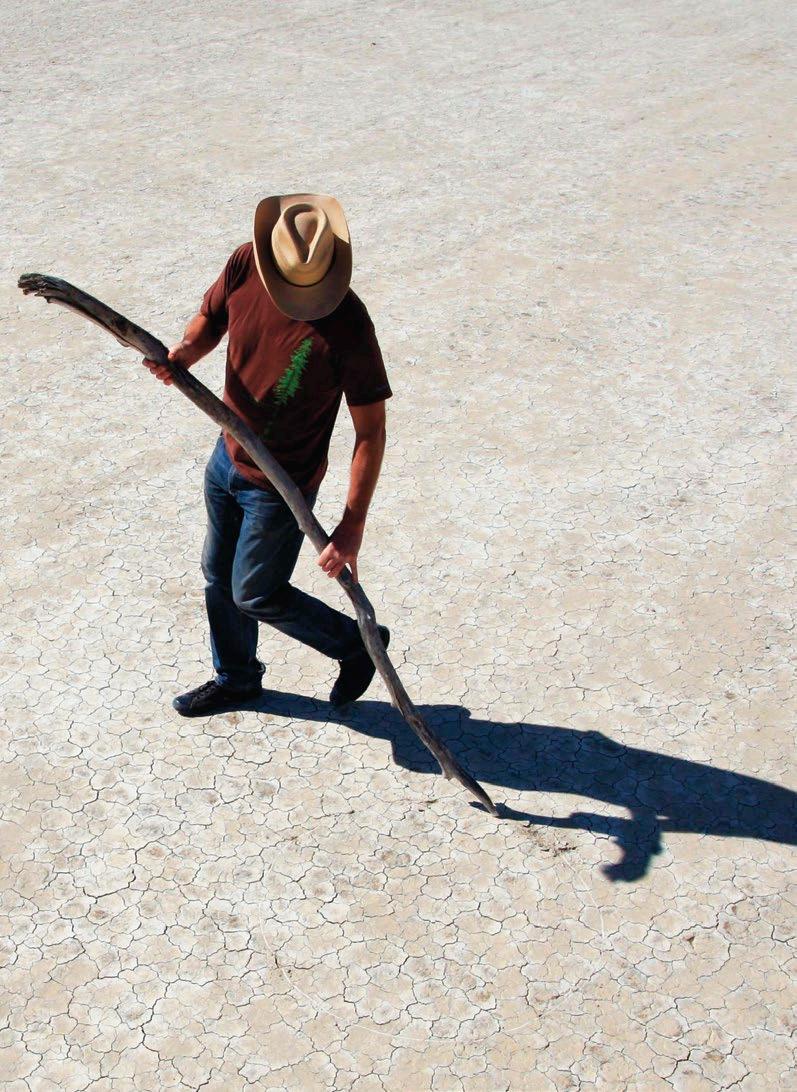
the page
SEE THE WORLD Turn

12

...DIFFERENTLY
Even if this looks like the work of extraterrestrials, these circular shapes are purely human in origin. After more than two years of planning and 15 days of hands-on work, the American artist Jim Denevan and three of his colleagues created this spectacular piece of art in the desert sands of Black Rock in Nevada, US.
A circumference of nine miles not only guarantees that this work is visible at an altitude of 39,000 feet (from which this photograph was taken), but also makes it the largest sand drawing in the world!
Olly Mann discovers that people find it surprisingly hard to say, “Get well soon”
A Strange Sympathy

Olly Mann presents Four Thought for BBC Radio 4, and the award-winning podcasts The Modern Mann and Answer Me This!
MY MUM’S ABOUT TO HAVE SPINAL SURGERY. There’s an illusion of choice about it: one consultant suggested she should have it immediately, while another said she had “acres of time” to make up her mind. (When pushed, he said she shouldn’t leave it untreated for more than six months.)
The operation—a lumbar decompression—is relatively straightforward, in spinal surgery terms, but does carry a risk of paralysis, as does any intervention around those nerves. If she opted not to have the procedure, though, there would be a chance of eventually becoming confined to a wheelchair anyway. So, surgery it is.
Friends and family have reacted to this news predictably, offering up chicken soup and platitudes, but also surprisingly, by talking in such negative terms that Mum has come to label the encounters “psychological theft”. This conversational crime is motivated by compassion, but can have devastating consequences, and is usually committed by accident. It occurs when—by thoughtlessly reflecting their own negative experiences—other people hijack your anxiety and put themselves in it, rather than provide relief from it.
I’LL GIVE YOU AN EXAMPLE. Last week Mum went to the post office and bumped into Geoff (not his real name), who works for the local travel agent. “How are you?” he asked.
“Not great,” she replied. “I’ve been having some trouble
| 01•2018 14
IT’S A MANN’S WORLD

with my back and I’m going to need surgery.”
“Oh, GOD!” he responded. “The back is the most dangerous place to operate. My mum had that and she was in terrible pain. Make sure you
get all your affairs in order before you go under the knife—it takes months to get over it!”
Now, Geoff’s intention had been benign. He’d relayed his own mother’s story to show sympathy,
READER’S DIGEST 01•2018 | 15 ILLUSTRATION
BY MATTHEW BRAZIER
ie, demonstrating his knowledge that chronic back pain is nasty. He’d also wanted to show empathy—to articulate that Mum is hardly the only person to have suffered with this condition, and she needn’t feel alone. As he walked away, Geoff was probably thinking: I’ve just related on a personal level to this panic-stricken woman. I’ve told her a story about someone I know who experienced similar obstacles and came through alive. Well done, Geoff, you’re quite the man! You’re getting a bubble bath tonight! Needless to say, this was not Mum’s takeaway from Geoff. She heard: pain, danger, knife, months.
Astonishingly, another acquaintance reacted to Mum’s predicament by actually reeling off statistics for unsuccessful back surgery. I can’t begin to fathom how this could be considered a helpful contribution, frankly—but, if I’m being charitable, perhaps it was his way of saying, “You’re right to be concerned, yes; it’s a serious operation.” Inevitably, all Mum focused on was a frightening prognosis which, as it turns out, wasn’t even accurate for her specific condition (yes, I Googled it later).
ONCE YOU START LISTENING OUT FOR IT, it’s staggering how regularly people respond to another person’s ill health by talking extensively about themselves, or someone else they once knew; someone with a completely different medical history, who more often than not experienced a negative outcome.
Another acquaintance reacted to Mum’s predicament by reeling off statistics for unsuccessful back surgery
In the past few weeks, Mum’s mates and colleagues have regaled her with stories about their Auntie Trisha, who required rapid follow-up surgery; their neighbour, who had only a minor intervention, but then caught a superbug and never walked again; their grandmother, who had something similar—well not that similar at all really, a heart attack, but still, it’s all surgery, isn’t it? And yes, OK, she was 96, and yes, she’d chain-smoked for 50 years, but still, here’s the point, her recovery period was so strenuous…and on it goes. Psychological theft.
It’s really not that difficult to think of alternative things they could have said that would be equally true, but more beneficial to hear. “The specialists in our hospitals are among the best in the world.
IT’S A MANN’S WORLD | 01•2018 16
It’s amazing what they can do these days!”—that’s a good one. “You’re going to feel much better afterwards. It’ll be a new lease of life for you!”— that’s another. “Is there anything I can do to help?”—that’s always a welcome offer. Positive suggestions, rather than compounding the negative thoughts inevitably circling around inside the head of someone who’s already anxious about surgery, are all that’s required.
I’M NOT SUGGESTING PATIENTS should be sheltered from the reality of the risks they’re taking. But if the decision to have surgery has already
been taken, or can’t really be avoided, what’s the purpose of highlighting the drawbacks? To put it another way— when our pipes burst, we want our friends to recommend a good plumber, rather than tell us about the torrential flood they saw on the News at Ten. When we’re at the GP, we prefer nurses who say, “You may feel a pricking sensation”, to those who say, “This is going to hurt”.
And when we’re facing a scary and precarious medical treatment, the results of which are entirely out of our own control, surely it’s just common sense to say: “Get well soon, and how can I help?”
BANTER BOARDS
Because we’ve all seen enough two-for-one specials...
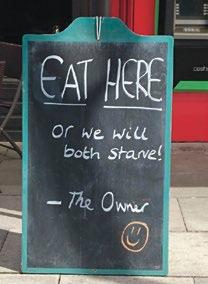


READER’S DIGEST
01•2018 | 17
SOURCE: SADANDUSELESS.COM




































EQUITY RELEASE Want to release the money
your home? Be sure to download our trusted guide readersdigest.co.uk/release readersdigest.co.uk/release For a FREE instant calculation call: 0800 029 1233 This is a Lifetime Mortgage. To understand the features and risks, ask for a Personalised Illustration. Reader’s Digest Equity Release is a trading style of Responsible Life Limited. Only if your case completes will Responsible Life Limited charge an advice fee, currently £1,295.
tied up in
Films
 by e va mackevic
by e va mackevic
Movie of the Month
■ comedy: brad’s status As human beings, we spend a lot of our time preoccupied with ourselves—and Brad Sloan (Ben Stiller) is no exception. Sure, he loves his wife Melanie, wants only the best for his gifted son Troy and his non-profit business is flourishing. Yet…something keeps Brad up at night. Should he have sold out to become rich? Are his more successful friends phasing him out? Is he a failure? As he’s touring prospective colleges with Troy, he seeks the answers to these questions. Brad’s Status is a self-contained slice of life, brimming with kindness and humour that work like a soothing balm for the restless mind. It’s also Stiller’s best performance to date, complemented by an equally strong supporting cast. They don’t make ‘em like this anymore.
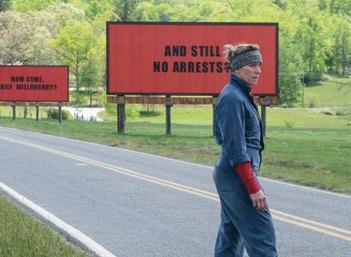
unconventional way—and all hell breaks loose. Written and directed by Martin McDonagh, the man behind In Bruges and Seven Psychopaths, it’s a deliciously obnoxious nail-biter.
■ history: darkest hour On the heels of the recent Churchill biopic starring Brian Cox, comes Darkest Hour—a drama detailing the Prime Minister’s first tumultuous month in office as he decides the fate of Western Europe in the early days of the Second World War. Gary Oldman—who’s unrecognisable as Churchill— delivers an Oscar-worthy performance, supported by Kristin Scott Thomas as his loyal, dignified wife Clementine.

entertainment
© vertigo releasing / 20th century fox / focus features 19

■ docUmentary: eriC Clapton: a life in 12 bars A treasure trove of fascinating archive footage and ridiculously good music, this extensive doc covers just about every aspect of Clapton’s five-decade career. More than anything, it’s “Slowhand’s” love letter to blues music, that occasionally dips into personal aspects of his life, such as his substance abuse issues and his turbulent love story with Pattie Boyd (the inspiration for “Layla” and “Wonderful Tonight”). Though a tad too long, it’s an exhilarating treat for any music fan.

■ drama: last flag flying Three former Marines who served in Vietnam are reunited by a tragic event 30 years later. With incredible performances from Steve Carell, Bryan Cranston and Laurence Fishburne at the forefront, the film covers myriad complex issues—from politics to friendship—and provokes a similar number of emotional responses. It’s morally ambiguous, but full of heart; poignant, but absurdly hilarious. Director Richard Linklater aims high and hits the mark with near perfection.

On Your Radar: Stuart Collinson, retired
WatchinG: strictly Come dancing (bbc one) I enjoy the dancing, along with the varying judging and the sheer glitz and glamour.
readinG: the turncoat by alan murray A WWII story based around Glasgow and why the Germans had pinpoint accuracy on the shipyards.
online: bbc Website I like viewing the BBC’s website to read the latest news items. I also enjoy the viewers photographic section.
listeninG: t. rex discography
I like T. Rex’s funky glam style of music. It was my era too! I’ve even been to see a T. Rex tribute band.
Fancy appearing in this section? Send your current cultural favourites, along with short descriptions, to readersletters@readersdigest.co.uk
Fancy appearing in this section? send your current cultural favourites, along with short descriptions, to readersletters@readersdigest.co.uk
| 01•2018 20 © altitude / curzon artificial eye READ MORE At readersdiGest.co.Uk/entertainment
by e va mackevic
rachmaninov: the two-piano suites, six morceaux by charles owen, katya
apekisheva
On Our Radar Music
Album of the Month

Cleanse your musical palate in the new year with some of the most beautiful music in the Romantic repertoire, by delving into the works of Sergei Rachmaninov. One of the most highly acclaimed piano duos working today, Charles Owen and Katya Apekisheva, perform his expressive works for two pianos and four hands—two set-ups that reveal the composer’s infinite creative flair and draw out some of the most intense, rich flavours that piano music has to offer. Begin with the densely textured, poetrybased Suite No. 1, followed by the more traditional, emotionally ripe Suite No. 2, culminating in the atmospheric Six Moreaux, or “Six Musical Moments”—a series of stand-alone pieces, each representing an individual mood, be it a sombre funeral march or a mystifying Barcarolle. The works are a testament to Rachmaninov’s mastery of piano technique and are the perfect accompaniment to drab winter evenings at home.
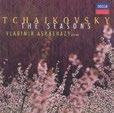
like this? yoU may also like... tchaikovsky: the seasons by vladimir ashkenazy For more quintessentially Russian lyricism and flowing melodies, turn to one of Rachmaninov’s closest supporters, Tchaikovsky. The Seasons is a set of fervent character pieces, played here faultlessly by Ashkenazy.

PUsh Festival, manchester, January 12–27.
Enjoy some of the most exciting film, theatre and visual arts from the North East. Visit visitmanchester.com for details.
bristol slapstick Festival, January 26–28. Brighten up your January with a celebration of the best in vintage comedy film and TV. Visit visitbristol.co. uk for details.
hogwarts in the snow, london, until January 28.
Treat yourself (or the Potter fan in your life) to a festive tour of the Harry Potter studios. Visit wbstudiotour.co.uk for details.
Reade R ’s d igest 01•2018 | 21
READ MORE At readersdiGest.co.Uk/entertainment/mUsic

“I Suppose I’m
22
Sir David Jason looks back at his success—and explains why, when it comes to his career, he’s still open all hours
BY JACK WATKINS
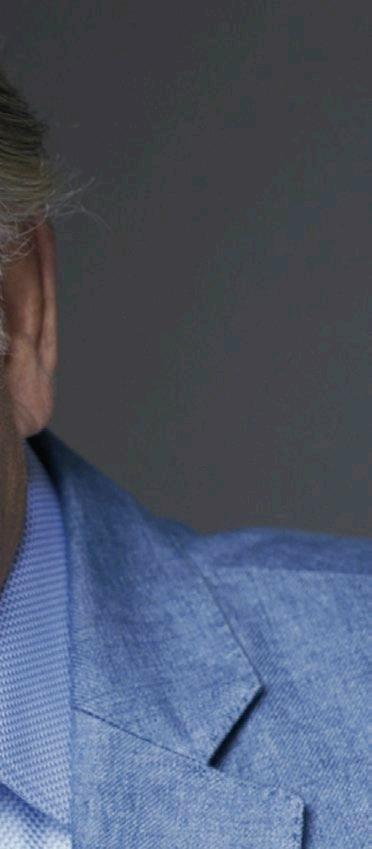 © COLIN BELL
© COLIN BELL
SIR DAVID JASON HAS BEEN DOING A LOT OF RETROSPECTIVE PONDERING LATELY , and he admits the process has sometimes been painful. In addition to his new book, Only Fools and Stories, he’s done two documentary series for UKTV Gold, one on the making of Only Fools and Horses, and another looking at his entire career to date on stage and screen.
“It’s been a bittersweet experience,” he says, “because you’re being asked to go back and review some of the greatest and most enjoyable moments in your lifetime. You see pictures and bits of you that show you happy in that period, but it’s all so long in the past and you can’t get it back. In one way it’s rewarding, and in another you say: ‘Gosh, I wish I was still doing that, I wish I was still there.’ ”
A Workaholic”
ENTERTAINMENT
Even so, ultimate perfectionist that Sir David is, his recollections are compelling. The book follows on from his autobiography My Life, published in 2013, in which he gave us a warm and funny account of growing up in a small terrace house in Finchley, North London, and his tentative early steps as an actor, leading on to becoming the multi-awardwinning household name that he is today. “The success of that book delighted everybody, me included,” he agrees. “So the publishers came back and asked if I’d write another one. I said, ‘Well, no, I’ve just done it, I’ve told it all, I’ve nothing left to say,’ but they pointed out I’d played an awful lot of characters in my time, and that maybe I could tell some stories related to that?
“It set fire to my imagination, because one thing people haven’t wanted me to explain in any detail up to now is how I go about creating my characters.”
Much loved as he is, it’s possible we don’t quite realise what a unique talent Sir David is. Comedy greats such as Eric Morecambe, Frankie Howerd and Tommy Cooper maintained their famously funny personas in everything they did. By contrast, the comedy-character acting star, as embodied by Sir David, who changes his style and appearance to fit whichever part he’s playing, is a relatively rare type. “I’ve

Only Fools and Horses ran for 22 years; (right) David at 14
always thought of myself as an actor first, with the comedy second,” explains Sir David, who cut his
I HAD A CHANCE TO DISPLAY A SERIOUS SIDE —THERE WAS MORE TO ME THAN JUST FALLING THROUGH THE HATCH OF A SALOON BAR
24
| 01•2018 “I SUPPOSE I’M A WORKAHOLIC”

dramatic teeth in repertory theatre in the late 1960s, continuing to maintain a busy stage schedule throughout the years of his greatest TV success with Open All Hours and Only Fools and Horses.

“It wasn’t until I did A Touch of Frost that I had a chance to display that serious side because, especially in the
theatre, producers always wanted me to do comedy as there weren’t so many people able to do that compared to dramatic parts. It was Porterhouse Blue and A Touch Of Frost that gave me the chance on TV to show there was more to me than just falling through the hatch of a saloon bar.”
It’s no surprise his great heroes
01•2018 |
25
The infamous
boy; (below)
David aged 18, outside the builders’ yard

were Peter Sellers and Ronne Barker, two of the finest character-comedy actors Britain has produced. Having worshipped the latter’s work from afar for years, once they started working together on TV, notably in Porridge and Open All Hours, Barker became both mentor and friend to Sir David, who remembers him fondly. “He was an original talent not just because he was a comedy actor, but because of his ability to write and create humour out of virtually nothing. And the thing that always impressed me was that,
RONNIE BARKER, BIG AS HE WAS IN THE PUBLIC’S MIND, WAS AN AMAZINGLY POLITE AND GENEROUS PERSON
big as he was in the British public’s mind, he was such an amazingly polite and generous person.”

Barker’s meticulous approach to fleshing out a role rubbed off on him too, but it’s fascinating to read in Only Fools and Stories about how the Del Boy character came to be. When I remind Sir David of the way he drew inspiration for his patter from the lingo of the illegal street traders he used to watch selling black market goods in London’s Oxford Street, he laughs. “Cor blimey, yes! They were better than me, that lot. It was fascinating to watch. Of course, I know they were con artists and you learned to keep your hands in your pockets, but I picked up so much. Nothing’s ever wasted, you see.”
Accompanied by his wife Gill and daughter Sophie, he was delighted to
26 | 01•2018
Del
meet up again with his old sparring partner Nicholas Lyndhurst at the National Film Awards earlier this year, when the pair received a Lifetime Achievement Award in recognition of their work together on Only Fools. “We don’t get in touch very often because we’re both always busy, and he’s on the south coast, while we’re up here in the wilds of Buckinghamshire.”
BUSY ISN’T REALLY THE WORD.
In addition to another documentary he’s just made for Channel 4 on the history of spying, Sir David has spent the summer filming the fourth series of Still Open All Hours. He says that, when they decided to revive the old sitcom classic in 2013, they were delighted to find the original shop and street in Doncaster was still there, unchanged from the 1980s. Despite the long filming hours, he still gets a buzz. “I suppose I’m a workaholic, but I love the camaraderie. And Roy Clarke, the writer, is a genius. Lord knows what goes on in that man’s brain at night. He must be on jet fuel.”
Despite his vast experience, he admits nerves never go away, especially when they shoot the studio scenes before a live audience at Pinewood. “It’s like a first night every week,” he sighs. “It’s not fear, it’s…oh…your whole being is heightened with the thoughts: Is this going to work? Is it going to fail?
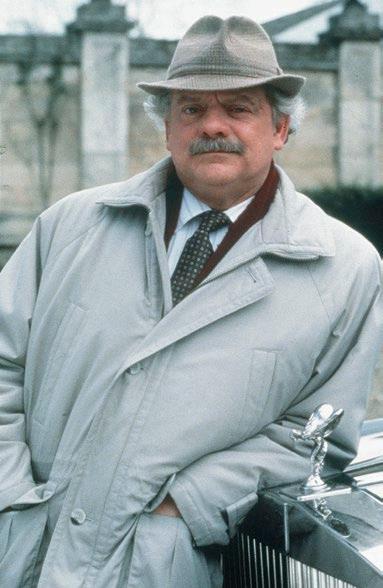
A Touch of Frost gave the actor a chance to show his serious side
Famously driven, he’s certainly not winding down. “It’s the work ethic. One thinks maybe another Only Fools is still hiding out there. That and Hollywood, although, mysteriously, they don’t seem to answer my calls. Never mind. I’m quite happy doing what I’m doing.”
Only Fools and Stories: From Del Boy to Granville, Pop Larkin to Frost, by David Jason, is published by Century in hardback, ebook and audio.

© AF ARCHIVE/ALAMY STOCK PHOTO 01•2018 | 27
Common Property PROBLEMS
Whether you’re already a homeowner or looking to buy a property for the first time, it’s important you’re aware of problems that could cause issues. We take a look at some of the most common ones
Before agreeing to buy or sell a property, these issues are the keys things to look out for and fix:
Rising damp
Rising damp happens when a property’s bricks absorb water from the ground up. Most properties have a damp-proof course to stop this happening. However, many older properties don’t. Rising damp can also occur in newer buildings if the damp proof course has been breached.
Signs of rising damp include: mould patches on the inside of the property, “tide lines” on the inside and outside, and rotting skirting boards or floors.
Treating rising damp can be very
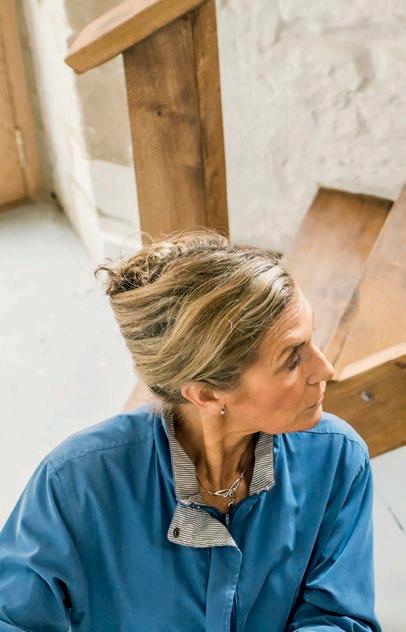
difficult and may also involve installing a new damp course.
Wall ties
The walls of most properties are composed of two brick layers with a cavity inbetween. These layers are held in place by metal wall ties, which stop them from parting company. But, over many years these ties can start to corrode. This is a particular problem in coastal areas where the salt air gets to them, causing the ties to expand and push out mortar, resulting in cracked bricks. In severe cases, the outer wall can fall down though this is quite rare.
To spot wall tie issues, look for cracking brick work or render, particularly in a
PARTNERSHIP PROMOTION

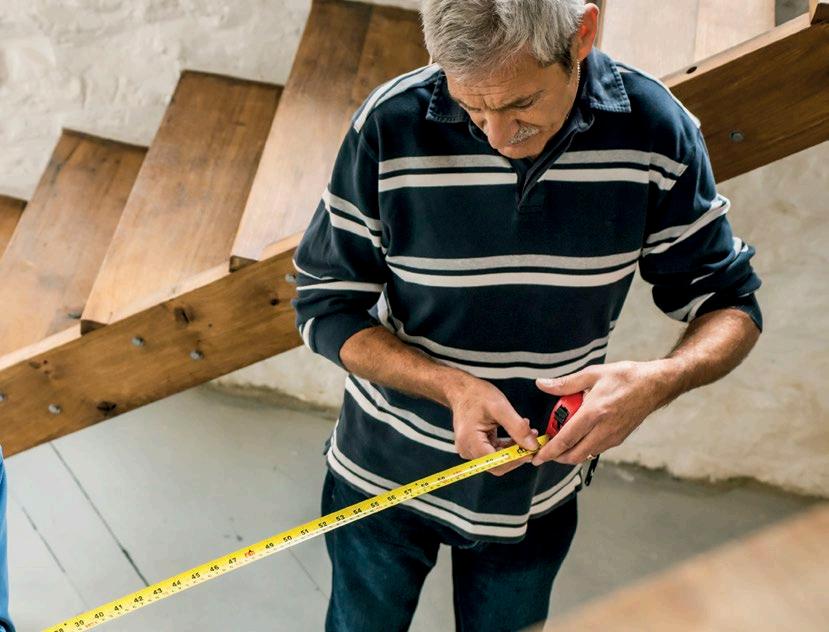
“stepped” fashion. Replacing wall ties can be done, but may be expensive.
Slate roofs
The majority of slate roofs are on properties over 100 years old. This means many original slate roofs are now coming to the end of their lives and will need replacing. Look for broken or missing slates, “flaking” of the slates and “powdering” of the underside of the tiles.
Subsidence
Subsidence happens when the ground under a property moves or sinks lower, pulling the building’s foundations with it. Diagonal cracks wider than three
millimetres, wallpaper crinkling, door and window frames warping, and cracks where an extension joins the property are all subsidence signs.
Time is key with subsidence, once the problem is identified, underpinning of the property may be required. n
FOR MORE INFORMATION
Does your property have a problem that is making it difficult to sell? Reader’s Digest have teamed up with trusted property buyers House Buy Fast, who buy any property in any condition. To find out more visit the website readersdigestproperties. co.uk or contact Reader’s Digest Property on 0800 433 7979.
Bill Bailey, 53, is the much-loved British comedian, actor, musician and tV presenter. he’s best known for his quirky role in Black Books as well as appearances on Never Mind the Buzzcocks and Have I Got News for You
“I Remember” Bill Bailey
…we had quite a big kitchen garden and my parents grew lots of herbs and vegetables. I remember the strong sensation of soil, putting my hand in it, digging around and pulling things out of the ground. It’s quite a primal sensation that really stuck with me for years. I miss gardening a lot—it’s something that’s stayed with me, that love of the outdoors.
…until i left school and moved up to l ondon I spent all of my time, my formative years, in the West Country. It’s a beautiful place to grow up in. I would go on
long bicycle rides down country lanes. My father had a huge collection of Ordnance Survey maps, which I still love. I treasure these things—they’re like treasure maps. They’ve got little signs on them: churches with a spire, churches with a steeple; there’s a bit of marshland… They’re so detailed and one of the things that I remember about them is the little symbol to depict the steepness of the road. You’d have two arrows, like two chevrons, and that would be really steep. That’s the place I would aim for on my bike. I’d think, Oh, that would be great to cycle down there.
30
entertainment
michael melia/ a lamy Stock Photo

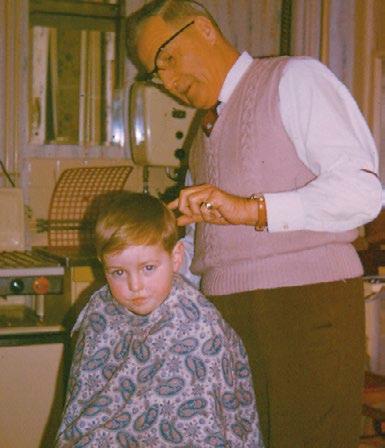
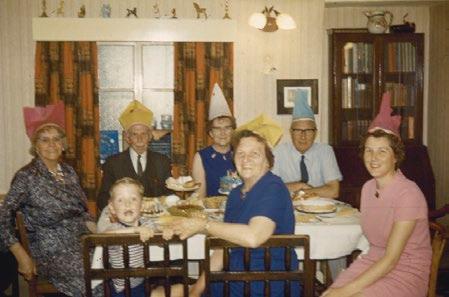
Getting his hair cut by Grandad, which put him off haircuts for life; (right) at the Christmas table with the family
...a wasp flew into my mouth. I was ten or 11 and I remember the wasp buzzing around my mouth. I was singing, or I just had my mouth open and I remember thinking, Ugh, ugh, there’s a wasp, and trying to spit it out. Of course, the wasp wasn’t happy about this either; it didn’t want to have flown in there. I blame the wasp as...well...it should have looked where it was going.
As I spat it out I thought, Oh thank goodness I didn’t get stung, but as a sort of parting gift it stung me on my bottom lip. I remember feeling this enormous jolt of pain and I almost fell off my bike. I pushed the bike to a phone box and I phoned my dad because he was a GP. I didn’t realise that my lip had swollen so much that
I could hardly speak and was saying “Uhhh”, so he just hung up. He eventually realised I wasn’t some kind of crank or crazy person and came and picked me up.
…my first home was a very old house. It was part of an E-shaped building and we were the end bit of the E. The house was Elizabethan and it had gone through various incarnations. One bit of the house had once been an old shop and you could still see the etching in the window, “Fry’s Chocolate”.
We had a garden with apple, plum and pear trees; there were vegetables like potatoes, rhubarb, raspberry canes, gooseberries. There was even an old bird table in one corner of the garden where mum would put out all sorts of peelings and carrot tops for the birds.
It had a groove around the edge.
32 | 01•2018
I loved to pour water and watch it flow around the channel and pour over the front—it was only when I was much older that I realised that it was actually an old cider press. It would originally have had a big stone on top of it and you would have put apples on it, crushed them up, and the apple juice would have flowed around it into a container. It was an idyllic childhood really.
…spending a lot of time with my grandparents when I came home from school because my dad was working and my mum was always busy in the kitchen cooking. She would have loved The Great British Bake Off so it’s a pity she’s not around to see it.
I would come home and her and my father’s mother and her mother would all be stood in the kitchen. There would be a whirlwind of activity and it would all just appear— jam tarts, rolypolys, turnovers, angel cake, fairy cake, Welsh cake, scones. My grandparents would be there and ask me about the day, you know, “How did you get on?” I remember it being like an inquisition.
My grandmother was a lovely, sweet woman and when my grandad died, she used to write to me reams and reams of letters
…my grandad had really strong opinions—he was a real socialist. He was a fascinating character to talk to. I learned a lot from him and he gave me a different outlook on the world. My grandfather was a stonemason and my grandmother was a florist. She was a lovely, sweet woman and when my grandad died—and he died many years before her—she used to write me reams and reams of letters, many of which I’ve kept.
…dreaming of being an actual astronaut. I wanted to change my name as well—I had this other persona, Mick Kennedy. I’ve no idea where it came from...well Kennedy, I guess, from the American president, or maybe the Kennedy space

r eader’s d igest
01•2018 | 33
Bill’s mother, Madryn
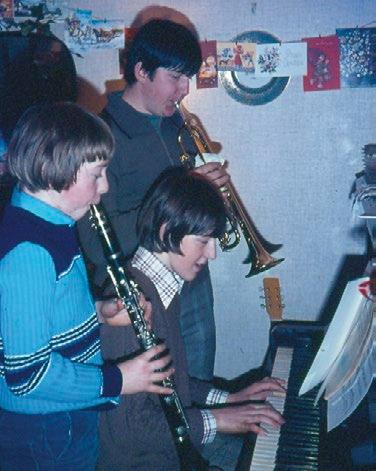
station—it was in the news when I was a kid. Maybe I was channelling Jagger or maybe it was somebody my dad knew who was called Mick. I have this vivid memory of imagining myself as an astronaut called Mick Kennedy. So I was channelling a pop star and, perhaps, the president.
It could have been very different— could have been Ringo Gandhi. I’ve no idea what happened to my dream, the whole notion of becoming an astronaut somehow faded. It ceased to become exciting and became very dull. You just go to the moon and then you come back again. Is that it?
…senior school was a transitional period. I was a real swot to begin with—I’d always do well in class and in the end of term exams and at the prize giving, I’d always get a prize. And then, I suppose, what the school said was that I’d completely gone off the rails: “He’s stopped, he’s lost his focus.” But I just saw it as being normal, you know?
I was just mucking about a bit, I was in the school band, I had a bunch of friends and I was simply discovering growing up. Schoolwork suddenly wasn’t quite as important to me as it had been before.
…b ehind c losed d oors there was the school band that I was a part of, and I remember at one of the concerts, we decided to bring the smoke machine along with us. Of course, there was too much smoke on stage. Nobody could see anything. They thought the building was on fire—it was a total disaster.
When I became a dad, it was wonderful because we didn’t think we’d have kids, but he came along and it was a great big bolt out of the blue
34 | 01•2018 i remem B er
Playing clarinet with his cousins. “We were the von Trapps of the West Country”
…music was actually a real salvation. I had a fantastic teacher, Lynda Phipps, and she was a real guiding light for me in school. She taught me piano and her husband was the head of music so I learned music theory with him. She encouraged me to do more, all the way through up to diploma level. Under her support and guidance I performed a Mozart concerto at 16 or 17—I’d never have done that without her encouragement. She would take you beyond what you thought you were capable of.
When I step out on stage now, I always think of Lynda Phipps. I remember, years ago, when I was doing my first arena shows—at Wembley for goodness’ sake—I mean, how did this happen? Standing on stage in front of 12,500 people and I can hear Lynda’s voice in my ear saying, “Yeah, of course you can do it.”
…doing a gig many years ago with an old friend from school. We were a double act, and we were performing in Edinburgh. A girl came along to one of the shows and I just happened to talk to her afterwards when I was on the stairs. She said, “Oh, I really enjoyed the set,” and we got chatting. We kept in touch and wrote to one another for about a year. I still have the letters now. Kristin and I were together for about ten years before we got married in Indonesia in 1998.
Bill playing guitar. “A career in entertainment was clearly on the cards”

…Black Books was great fun—great cast, great writing. It was also great to be part of a team; there was a collaborative sense of contributing to an ensemble piece rather than being a solo stand-up, which is a solitary profession.
It’s good to mix it up now and again, to be part of a play or collaborate or write with others.
I think you can sometimes do your best work that way.
…realising i ’ve carried some element from all those childhood trips to wildlife parks with me into adulthood. My mum was quite passionate about animal
r eader’s d igest
01•2018 | 35
up in knots about what life is all about, and then something like that happens and that’s it—you don’t have to worry anymore.
…being grateful for the way my early life panned out. My mum and dad are quite influential in that regard. They didn’t constrain me in any way or say, “You have to do this.” I was so lucky that they didn’t insist on a certain career and it’s allowed me to always do what I wanted to do. In hindsight I realise that it was a very generous sort of thing for them to do, and far-sighted in many ways. As told to Joy Persaud welfare. She wasn’t an activist, but she loved being outdoors and she loved animals. I remember this mantra she had, “I want you to love nature.” She always sat me down as a kid and drummed it into me. It’s obviously worked, as we’ve got a menagerie of rescue animals at home.
…when i became a dad it was wonderful because we didn’t think we’d have kids, but my son Dax came along and it was a great big bolt out of the blue really. It made life a bit more straightforward for me. Your priorities change and you realise it’s not about you and that there’s someone else you’re responsible for. I think that’s a good thing.
You can think too much about meaning sometimes, and tie yourself
Bill Bailey kicks off his nationwide Larks in Transit tour this month. to book tickets, visit atgtickets.com
qUestiOnaBle dediCatiOns
When writers get a bit creative with their book dedications... “this book is dedicated to everyone you hate. Sorry. life’s like that sometimes.”
“Dedicated to everyone who wonders if I’m writing about them. I am.”
“For mum and dad. your support—and the mental issues you gave me— made all of this possible.”
“For Colin Firth—you’re a really great guy but I’m married so I think we should just be friends.”
sOUrCe: sadandUseless.COm
i remem B er | 01•2018 36
FOR MORE, GO TO readersdigest.CO.UK/entertainment










To order the perfect gift: Visit flyingflowers.co.uk or call 0333 003 0892 & quote code RD1912











From £18.99 £16.14
Flying Flowers are offering Reader’s Digest readers an exclusive 15% OFF , simply quote RD1912 to claim your discount. Christmas Rose and Alstroemeria From £20.99 £17.84





Visit fl yingfl owers.co.uk or call 0333 003 0892
Heroes,
15% discount available on bouquets excluding Interflora, Help for
Prima, Good Housekeeping, international ranges and subscription products. Offer valid until midnight 30th June 2018. Prices correct at time of printing. For full T&Cs visit flyingflowers.co.uk
Exclusive 15% Quote RD1912 OFF
Yuletide

Changing your thought process can free you from feelings of guilt, shame and sorrow
Regrets No More
BY LISA FIELDS
38

HEALTH
PHOTO: ©SHUTTERSTOCK
Growing up in southern Germany, Karin Schätzle longed to play the cello, but no one in her small village could teach her. Instead, she learned the recorder and clarinet, and she continued to daydream into adulthood about becoming a cellist. She never sought lessons, though, convinced that she would have needed to learn during childhood to be any good.
Nothing can pervade your thoughts or inspire sleepless nights like the feeling of regret. Maybe you blame yourself for ending an old romantic relationship, making a bad career choice or being too afraid to step outside your comfort zone, like Schätzle.
“What shows up time and time again in a pattern of people’s regrets is that later in life, people tend to think about the things they didn’t do rather than the things that they did,” says Tom Gilovich, a psychology professor at Cornell University in New York. “There are so many things we didn’t do because we were socially afraid.”
That Surprisingly Good-forYou Bad Feeling
Regrets have a tendency to make you feel terrible, but those negative feelings aren’t always harmful. Research shows that initially, regrets
help you learn from mistakes. “Those who express regret over a decision they’ve made tend to make a better decision next time,” says Aidan Feeney, a senior psychology lecturer at Queen’s University Belfast.
By analysing your situation, you can learn lessons about yourself, make changes going forward and hopefully create better outcomes for yourself next time.
This technique worked for Schätzle when she had a fresh realisation about the cello in her forties: she might have needed to play in her youth if she hoped to play professionally, but that wasn’t her goal. Immediately, she began cello lessons.
“I wish I hadn’t waited so long, because I love it,” says Schätzle, now 52. “For a while, I was almost angry with myself, thinking if only I had started earlier, I would now be able
OLDER ADULTS WHO LET REGRETS OVERPOWER THEM CAN DEVELOP MENTAL AND PHYSICAL AILMENTS
NO MORE REGRETS | 01•2018 40
PHOTO ILLUSTRATIONS BY
MAGGIE LAROUX
to play more difficult pieces—until I realised that, for me, that’s not what the cello is about. It’s about the enjoyment I get out of practising.”
The Harm of Overthinking
What if regrets dominate your thoughts and you don’t (or can’t) take action to resolve them within a reasonable time frame? Unfortunately, these repetitive thoughts may negatively impact your life.
“Regret can be a very destructive emotion,” Feeney says. “If you ruminate on countless possibilities that are no longer possible, that can be very damaging.”
Picture, for example, a retired woman who wishes that she’d had children instead of just focusing on her career. Such an outcome can’t be changed and the regrets may become unbearable. Older adults who let regrets overpower them can develop mental and physical ailments.
“We have shown that regrets are a stronger predictive for depression in older than younger people,” says Carsten Wrosch, psychology professor at Concordia University in Montréal, who studies the impact of regrets across the adult lifespan. “Diseases such as heart disease may more
likely be observed. Not immediately, but after five, ten, 20 years.”
Rising Above Regrets
Several strategies can help people disentangle themselves from the powerful grips of their regrets.
“One of the primary functions of regret is to correct one’s mistakes,” says Marcel Zeelenberg, social psychology professor at Tilburg University in the Netherlands. “Another function is to make sure that we remember our mistakes and learn from them. For both of these functions, it’s important that regret is painful. Otherwise, it would not motivate.” Try these tactics.
n
Stop
judging the past. At 13, Paola Tosca was a typical teenager, more interested in socialising with

ALL PHOTOS ©SHUTTERSTOCK READER’S DIGEST 01•2018 | | 41
her peers than her parents. When her father died suddenly of a heart attack, Tosca immediately regretted how she’d chosen to spend her time.
“Not having enough time to know my father Stefano is my deepest and greatest regret,” says Tosca, now 62, from Grasse, France. “I realised I hadn’t devoted enough time to him.”
When people think about old decisions, they may mistakenly believe that they made the wrong choice, which can worsen feelings of regret.
“We often don’t give ourselves credit for making the best decision,” says Wändi Bruine de Bruin, professor of behavioural decisionmaking at Leeds University Business School. “You may have different information now than you had back then. If people want to use the regret productively, say, ‘Given what I
knew at the time, would I have done anything different?’ ”
To deal with her father’s loss over the decades, Tosca, the CEO of a computer company in Grasse and an author, has pushed herself to work hard and live her life to the fullest, so that he would have been proud.
“I built my life on his absence,” she says.
n Embrace inaction. In her youth, Olivia Steele of London said something to her grandmother that she wishes she could take back.
“One year, she made several coffee cakes, and I took it upon myself to tell her that my family and I were a little bored of coffee cake, and could she perhaps make another flavour,” says Steele, 28. “She visibly deflated at my words. She never made a coffee cake again.”

As you age, you’re likely to have less power to change circumstances that you regret. Accepting this powerlessness may help you cope.
“People have to settle with what they did or didn’t do, because there may not be so many opportunities to turn it around anymore,” Wrosch says. “We have shown—with respect to regret—if they can disengage from undoing the regret, they don’t experience the consequences. Engage in other meaningful activities
NO MORE REGRETS | 01•2018 42
in life. That can work as an override mechanism.”
n Seek inner wisdom. By age 60, you’ll have tallied significantly more regrets than you had at 20, but they don’t all have the same impact.
“The regrets that really get to people are unresolved regrets, things they could never fix,” Bruine de Bruin says. “If you feel like you should have gone to university, you can fix that when you’re relatively young. That can be harder to do when you’re older.”

Fortunately, many older adults are better equipped to handle their emotions. “They have the wisdom that comes with life experience,” says Pär Bjälkebring, senior psychology lecturer at Gothenburg University in Sweden. “When they encounter a situation a younger person would regret, they can handle it.”
For his research, Bjälkebring asked younger and older adults to record their regrets for a week.
“The older participants look at regrets in a different way, and
try to accept what is happening,” Bjälkebring says. “Over a week, older adults have less regret and use strategies to handle them. They’re more functional.”
Other research shows that older people are less overwhelmed by regrets. “When you’re younger, you can get caught up, and the concrete details are shameful,” Gilovich says. “When you get older, you think of it from a broader perspective: ‘Overall, I’ve lived a good life, even though I’ve made some mistakes.’ ”
IF THEY CAN DISENGAGE FROM UNDOING THE REGRET, THEY DON’T EXPERIENCE THE CONSEQUENCES
READER’S DIGEST 01•2018 | | 43

n Appreciate your situation. Research shows that the most common reason for regret is missed opportunity. People fantasise about benefits they believe they’ve missed while ignoring the disadvantages that would have naturally arisen.
“Missed opportunities are unrealised better worlds,” Zeelenberg says. “Had one chosen differently, or acted differently, the outcomes would have been better.”
Never got that promotion? You likely think about the missed income
without considering the extra stress that the position would have brought.
For more than 30 years, Maiju Kauppila of Helsinki, has worked as a state employee, although her real passion has been social media and marketing. She’s parlayed her enthusiasm for handicrafts and lifestyle blogging into a successful online presence for the past 12 years.
“The blog and all of my social media channels have become almost like a second job for me,” says Kauppila, 54, “yet I haven’t dared to abandon my career, even though I certainly could have.”
Instead of imagining an alternate reality, focus on the good in your life.
“Avoid making comparisons,” Bruine de Bruin says. “Don’t keep asking yourself if you’d be happier with another wife, another house, another job. It undermines the happiness you have. If you do make comparisons, look at what makes you lucky, rather than unlucky. Try to rejoice instead of regret.”
PEOPLE TEND TO REGRET INACTION—YOU MAY HAVE FEWER REGRETS IF YOU ACT MORE AND AVOID THINGS LESS
NO MORE REGRETS | 01•2018 44
n Employ optimistic thinking.
Gilovich’s research has found that you can diminish the power of your regrets if you can find something positive in your life that materialised because of the regretted situation.
“Rationalise it; identify the silver linings,” Gilovich says. “I shouldn’t have married this person. That was a mistake. But at least I have these great kids, which I wouldn’t have had otherwise.”
Joann Perahia, 62, of New York, regrets that she didn’t save more money when she was younger, but her silver lining makes her situation more tolerable.
“Now that I’m older, there’s no time to get the unearned money back,” she says.
“However, I did raise my children without working, and they are wonderful. If I’d gone to work to make that money instead of staying home, I don’t think they’d be as wonderful as they are.”
n Lead an active life. People tend to regret inaction more than their actions, so researchers suggest that you may have fewer regrets if you act more and avoid things less.
“If you’re trying to decide if you should do it or not and all the reasons are: ‘What would other people think?’, you should do it,” Gilovich says.
Rudolf Thode, 62, of Offenbüttel, Germany, had always dreamed of flying. But instead of training to be a pilot, he became a busy farmer with a wife who wasn’t supportive of his fantasy. Nevertheless, he found himself drawn to the nearby airfield in Rendsburg whenever he had free time. About 13 years ago, the farmer finally decided to take flying lessons.
“What a great feeling to view my farmland from high above,” Thode says. “It would have been a lot better if I’d followed through with my dream when I was in my twenties. What really counts, however, is the fact that it came true at all.”
UMM...WOULD YOU LIKE TO GO ON A DATE?
Some brazen (or brilliant?) folk share their go-to pick-up line:
“Are you a library book? Because I’d like to check you out.”
“Are you from Tennessee? Because you’re the only ten I see.”
“Do you have 11 protons? Because you’re SO-dium fine.”
“How much does a polar bear weigh? Enough to break the ice.”
“Do you know what my shirt’s made out of? Boyfriend material.”
SOURCE: THEAWESOMER.COM
READER’S DIGEST 01•2018 | | 45

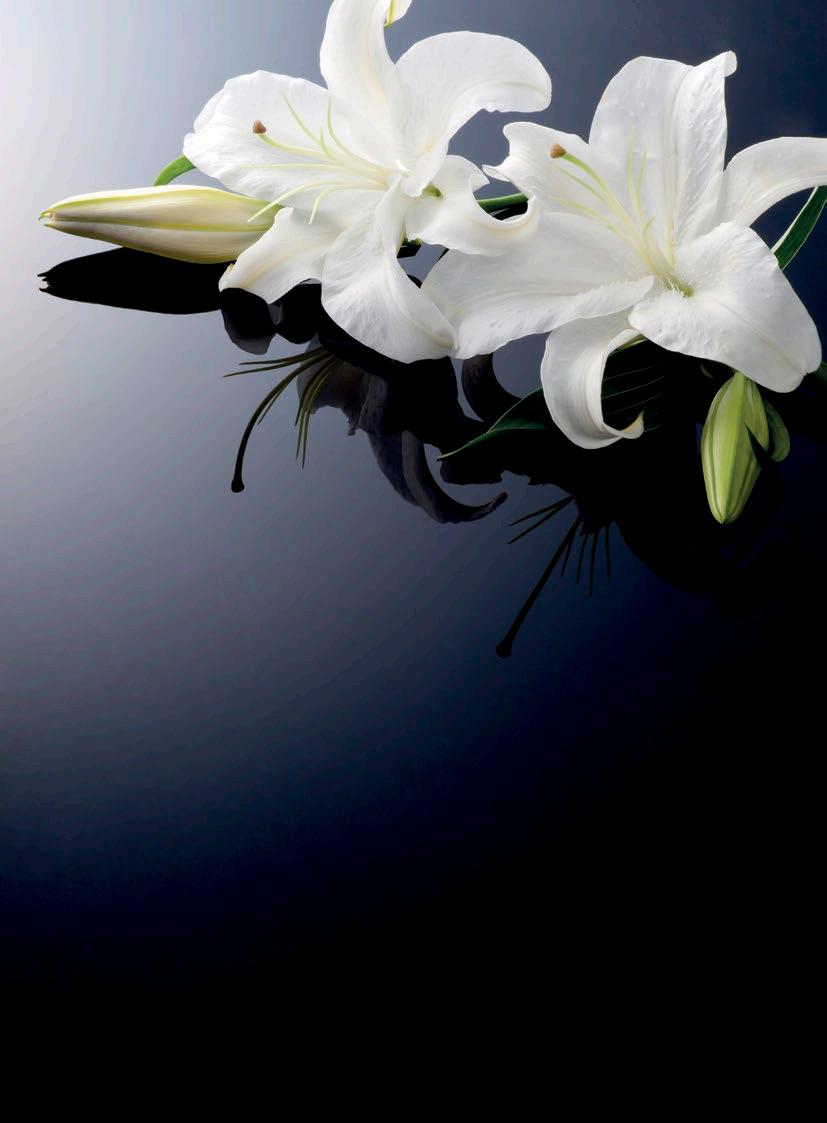
Lay Your Funeral Worries To Rest
Funeral costs are rising and there is no end in sight, find out how a pre-paid funeral plan could save you money
In 2004, funeral costs were around £1,920. Today it’s £4,078. That’s an increase of 110 per cent.1 If that trend continues, in another ten years it could be more than £7,200.2
With interest rates and the rise in funeral costs outstripping inflation there’s no guarantee that, when the time comes, your bank or building society savings will cover the cost of your funeral. Over-50s’ policies usually pay out a fixed sum, but they aren’t inflation proof and don’t guarantee that they will cover the future cost of your funeral director’s services.
With a pre-paid funeral plan, you can specify your wishes and secure the cost of the funeral directors’ services included in your plan, at today’s prices. So no matter how much their services rise in the future, once your plan is paid for, your family will have nothing more to pay for.
Costs continue to rise and show no sign of slowing down Readers Digest have partnered with Golden Charter, one of the UK’s leading funeral plan providers,3 to bring you a large range of flexible and a ordable funeral plans that can ease the financial— and emotional—pressures put on loved ones at a di cult time. Golden Charter has already helped more than half a million people with their funeral arrangements. ■
FOR MORE INFORMATION
To request a free no-obligation pack for funeral plans and a stylish free pen, call Golden Charters UK-based advisors FREE on 0800 090 2338 and quote reference READ1017 or visit our website readersdigest.co.uk/funeral-plans
1 SunLife cost of dying report 2017. 2 Projections by Golden Charter based on SunLife cost of dying research. 3 For further details see goldencharter.co.uk/legal-disclaimer
PARTNERSHIP PROMOTION




Built for power. Built for precision. Designed cordless.




“I’ve used it three times now and can quite honestly say it’s so light and does a marvellous job, with no wires and no having to ll with petrol. This is the best mower I’ve ever owned and when I’ve nished I just pop it on charge for next time. Thank you Gtech.” T. O’Neill












Preparing your garden for spring can be a chore. Once you’ve tried the Gtech Cordless Lawnmower you will wonder why you ever put up with power cords or petrol motors.
Power and Precision
The powerful 36V Lithium-ion battery gives the Gtech Cordless Lawnmower up to 40 minutes runtime – enough to mow 384 square metres (4,133 sq. ft.) or the average garden twice on a single charge.* The precision carbon steel blades and powerful motor deliver an impressive wide cut and neater edges too.
Innovation and Simplicity
There are no cables to untangle or constantly whip out of the way and no messy petrol motor to top up. The large wheels make it feel lightweight and manoeuvring around lawns seems almost effortless. The Lawnmower comes with a generous 40 litre collection bin with an ingenious ap that tells you when the bin needs emptying. The cutting height is easily adjustable, moving between 3cm to 8cm in 1cm increments. So whether it’s the rst cut of the season or a mid-summer pristine nish there is a setting to meet your needs.

Easy Setup
The Gtech Cordless Lawnmower couldn’t be simpler to use: just attach the bin; extend the handle; insert the battery; press the lever and go. At the end of the job, it won’t take over your shed either. Once you’ve put your battery on charge, (5 hour charge time) simply fold the handle down for compact, clutter-free storage.
Wide cut - fewer passes
The Gtech Cordless Lawnmower has a large 430mm (17”) diameter blade, meaning fewer passes while neatly cutting close to all the borders in your garden.
Don’t just take our word for it...
We really do care what you think about us. Go online to see the thousands of independent reviews our customers have given us; and do check out our product videos at www.gtech.co.uk.



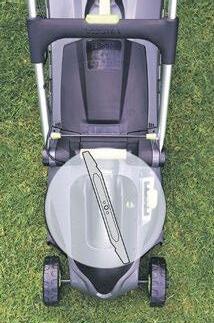
2-year Manufacturer’s Warranty. *Source: RHS 2014. Runtimes may vary depending on length and dampness of grass. See www.gtech.co.uk for full details. †Excludes UK islands and highlands where delivery is still free of charge but takes 2-3 days. 6pm cut-off for next day delivery. See www.gtech.co.uk for full details.
CPN2079 Order the Cordless Lawnmower direct from Gtech Includes free UK delivery† 0800 051 83 53 24 hour orderline www.gtech.co.uk Easy online ordering
430mm
Wide blade for fewer passes
36V Li-Ion Battery
7 Ways To Make More Time
BY SUSANNAH HICKLING

Susannah is twice winner of the Guild of Health Writers
Best Consumer Magazine Health Feature

1 ONLY HAVE THREE MAJOR THINGS ON YOUR DAILY TO-DO LIST. To reduce stress and help you become more effective, have a daily plan for the tasks you need to accomplish, but include a maximum of three challenging or time-consuming jobs. Getting these done will give you a sense of achievement.
2 CALL TIME ON SOCIAL MEDIA. We’re not suggesting you stop for good, but social media is a terrible timewaster. So set an alarm to signal that it’s time to stop checking Facebook, Instagram and other sites and apps. Then do the things you always say you’re too busy for— going for a run or writing that novel.
3 BUILD IN BUFFER TIME. Given that almost everything takes longer than you expect, leave a cushion of ten to 15 minutes in between tasks to allow yourself to recharge and eliminate stress.
4 LEAVE TEN MINUTES EARLIER THAN YOU NEED TO. Similarly, to avoid any angst about arriving late, build in an extra ten minutes to your outward and return journeys.

| 01•2018 48 HEALTH

5 THE NIGHT BEFORE. We’ve all endured that manic morning rush. To avoid it, check the weather, transport and traffic reports online and pack everything you need the evening before.
6 LEARN WHILE YOU DRIVE. If you’ve always been meaning to learn Spanish or read the classics, your car journey can help you realise that ambition. Even being stuck in a traffic jam is bearable if you’re absorbed in an exciting audiobook.
7 DRAW UP A TIMELINE FOR IMPORTANT PROJECTS. Even if your project is a long-term one, start the planning process as soon as possible. Write out a timeline, with short-term goals leading up to the achievement of your long-term ambition. But be realistic.
SPORTS MEDICINE
If you’re thinking about getting active but not sure what kind of exercise is best for you, consult your fitness prescription first.
DIABETES
EXERCISE RX Resistance training. (for example, using dumbbells) and cardio (any exercise that raises heart rate, including running and cycling).
DOSE Resistance training three times a week, plus 150 minutes of cardio. Exercise can help stabilise your blood glucose levels.
HEART DISEASE
EXERCISE RX Walking and resistance training.
DOSE At least ten minutes’ exercise every day for a total of 150 minutes a week, plus resistance training on two to three days a week. Aim for a brisk walk every day, making sure you get a bit breathless. Improving muscle mass can help battle heart disease.
ARTHRITIS
EXERCISE RX Water workouts.
DOSE 30 minutes in the pool, two or three times a week. Working out in water provides 12 times the resistance of air, allowing you to build muscle while giving your joints an easier time.
DEPRESSION, ANXIETY & STRESS
EXERCISE RX Yoga and cardio.
DOSE Daily yoga plus 150 minutes of cardio exercise a week. Exercise boosts feel-good endorphins, and yoga can help you focus on the connection between mind and body.
01•2018 | 49 READER’S DIGEST © SHUTTERSTOCK


Cold Comfort
HAVING THE SNIFFLES IS MISERABLE, but what brings relief and what fails to touch it?
YES TO:
n Drinking water. Keeping yourself well hydrated will act as a decongestant and replace fluids you lose through having a runny nose.
n A saltwater gargle. A teaspoon of salt dissolved in warm water can be soothing. Gargle four times a day.
n Blowing your nose properly. Don’t sniff but instead blow gently into a tissue while blocking one nostril.
n A steamy shower. The warm, moist atmosphere in a shower will help moisturise your nasal passages.
n An extra pillow. Propping up your head just a little bit higher will help drain your nasal passages.
n Zinc lozenges. Some studies say zinc works; others that it’s a waste of time. However, an analysis of
several studies showed that zinc in lozenge or syrup form reduced the length of a cold by a day, especially when taken at the beginning. Definitely worth a try…
NO TO:
n Ibuprofen. One British study found that when people took this common anti-inflammatory to treat their respiratory tract infection, it sometimes came back.
n Antibiotics. Colds are caused by viruses, not bacteria. Antibiotics only work on bacterial infections, and, therefore, won’t shift a cold.
FIRST AID FIRST
Ever wondered if you’d be able to step up and save a life in the event of a medical emergency? Knowing how to administer first aid will mean you’re always prepared. Both St John Ambulance and the British Red Cross have courses in first aid—to find one near you, visit sja.org.uk or redcross.org.uk
| 01•2018 50 © SHUTTERSTOCK
HEALTH
From wedges to stilettos, lots of us spend far too much time in footwear that treats our tootsies badly. If this applies to you, try these simple soothers:
Calf massage. Wearing heels for long periods can eventually shorten your calf muscles, so, to release them, sit on the ground with your knees bent and feet on the floor. Grasp one ankle, placing your thumb just above your Achilles tendon. Press your thumb into the bottom of your calf muscle, hold for five seconds, then release. Move an inch up your calf and repeat the pressure. Continue pressing and releasing until you reach your knee, then switch legs.
Shoebox soother. Fill a shoebox with golf balls. Then, whenever you need to soothe your feet, take off a shoe and rub your foot over the balls.
8 Ways Booze Affects The Boys
1. Lacklustre libido. Too much alcohol can cause a drop in testosterone levels.
2. Withered testicles. Sperm quantity and quality drop too.
3. Brewer’s droop. Booze depresses the central nervous system, affecting some men’s ability to get or keep an erection.
4. Beer gut. Too much of the hard stuff makes it harder for the body to burn off fat for energy.
5. Moobs. Enlarged breasts or “man boobs” are another side effect of heavy drinking over time.
6. Balding body. Worried about losing the hair on your head? If you down too much alcohol, you may shed body hair too.
7. Gout. Too much of anything intoxicating can lead to gout, which causes painful, inflamed joints.
8. Spots. Excessive boozing can give you zits. It can also make rosacea worse, so you may end up with a permanently red face.

MEN’S HEALTH © SHUTTERSTOCK
01•2018 | 51
HIGH-HEEL HEALING READER’S DIGEST
THE NUTRITION CONNECTION
Eat Yourself Happy
BY FIONA HICKS

Fiona studies
Naturopathic Nutrition at the College of Naturopathic Medicine, and is a member of the Nutrition Society
FORGET RESTRICTION AND FADDY WEIGHT-LOSS DIETS—grey and wet January is the time to boost your mood through food! And that doesn’t mean turning to the remaining Christmas chocolates. Here’s how to enhance your happiness healthily:
EAT THOSE TURKEY LEFTOVERS. Poultry is a rich source of tryptophan, a type of protein that helps you to make the mood-boosting brain messenger, serotonin. It may sound a bit complicated, but really all it means is that eating turkey could help you create and sustain a sense of well-being (cranberry sauce optional!).
BEST IN SEASON: CELERY
Why eat it? This fibrous vegetable houses numerous phytonutrients, which help to fight inflammation in your body. It also contains a special compound that can help protect your stomach lining.
How to cook it? Celery is at its best when eaten raw. Try using as a crudité for dips, or spread peanut butter on it for a satiating and refreshing snack. Save the celery leaves too—these are lovely in salads.

| 01•2018 52 HEALTH
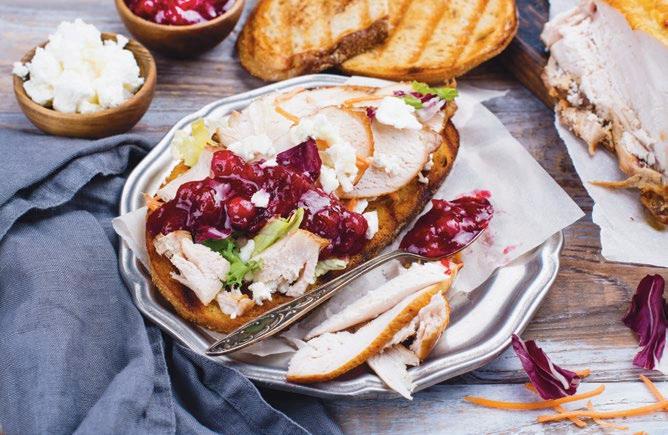
ENJOY A SPINACH SIDE SALAD. This humble green leaf is full of magnesium. Known as “nature’s tranquiliser”, studies show that consumption of this mineral can help you relax. Try tossing the spinach with some extra virgin olive oil and apple cider vinegar.
SIP ON GREEN TEA. This drink isn’t only warming, but it’s also full of goodfor-you natural compounds. One of these is the amino acid l-theanine, which alleviates tension and anxiety. Why not make post-meal cup of green tea your New Year’s resolution?
SAY NO TO SUGAR. The trouble with the sweet stuff is that it can cause spikes and troughs in your blood
sugar, leading to difficulty in concentrating, distraction and the general feeling that you’re not on top form. Try a 30-day experiment where you cut out all sweet treats to see you if notice a difference—you’ll be amazed at how quickly you don’t miss it.
WHIP UP A STIR-FRY. Be sure to include cabbage, peppers and garlic. All of these are brimming with vitamin B6, which plays a key role in regulating mood. In fact, volunteers who consumed a vitamin B6-free diet for 55 days developed depression and confusion, which resolved when they took vitamin B6 supplements.
Nutrients are most effective when they’re in whole-food form, though, so start sautéing those vegetables!
01•2018 | 53 READER’S DIGEST © SHUTTERSTOCK
A Terrible Economy
BY MAX PEMBERTON

Max is a hospital doctor, author and newspaper columnist
SOMEWHERE ALONG THE WAY, THINGS HAVE GONE HORRIBLY WRONG. I don’t understand why, though—I did what my mum told me: I worked hard at school, I tried hard in my exams. Now I’m supposed to be reaping the benefits. A life of fun was supposed to be my reward.
I’ve spent the best years of my life studying so I can make sick people better again, only to find life as a doctor hectic and tiring. While all my friends—who spent the majority of their three years at university studying the bottom of beer glasses—are busy sunning themselves on holiday, travelling the corners of the earth or sponging off their parents, here I am stuck in the windowless Medical Assessment Unit not even sure if it’s night or day.
A&E is so full of drunks, though, I could almost imagine I were in Ibiza. Still, I shouldn’t complain. The reality of working in acute medicine is that you come into contact with the less than glamorous aspects of human nature: drugs; crime; abuse; violence.
MISS TALBOT HAS BEEN BEATEN UP. “My name’s Rosie,” she corrects me. She’s just had her 18th birthday; she’s the same age as I was when I went to medical school. She’s painfully thin. She was found unconscious in the doorway of a shop. She’s been admitted because she has a head injury, and needs to be kept in for observation. While she was in A&E, though, she asked to be tested for HIV and hepatitis. It’s not
| 01•2018 54 HEALTH

normal practice, but sometimes protocol has to go out the window.
There’s also the problem of her pimp. She’s lost her night’s earnings and the A&E staff were worried about discharging her because she was so scared of what he might do to her when he finds out. We sit and talk. She tells me about sexual abuse, about running away from home, about taking drugs, about becoming a prostitute. Her story is nothing new, but it’s the first time I’ve sat and talked to someone whose life it actually is.
The morning comes and with it the results of Rosie’s blood tests. They’re negative. I go and give her the good news. “Can I have a certificate or something? Have it written down that I haven’t got anything?” she asks.
“Erm, why do you want that?” I ask.
She looks at me, and suddenly I feel very naïve and stupid.
“You can charge more if you can prove you haven’t got anything.”
I feel sick. In my ignorance I thought that this would be some cathartic event for her, a reprieve. But for her, it’s economic. It’s not her fault. Nothing’s changed. She still inhabits a world in which her body is for sale. She still has to get money, and now she’ll be able to get a bit more for it.
I WANT TO BUNDLE HER UP and
take her somewhere safe, where people have respect for each other, where she’s not just a piece of meat to be bought and sold. But I can’t and instead I discharge her.
As she leaves, I think about how someone’s life can end up like this. About the choices that others made for her. And how somewhere along the way, things went horribly wrong.
JOZEF KLOPACKA/ALAMY STOCK PHOTO 01•2018 | 55
MEDICAL CONDITIONS—EXPLAINED
Hyperlipidaemia
WHAT IS IT?
This is the medical term for high cholesterol. Cholesterol is a fatty substance that’s made in the liver. It is essential for life, as it’s involved in a number of different functions in the body. It’s moved around the blood by joining with proteins to make a lipoprotein. There are two types: High Density Lipoprotein (or “good” cholesterol) and Low Density Lipoprotein, which can clog up the walls of the arteries and cause serious damage. The latter is therefore known as “bad” cholesterol.
WHAT CAUSES IT?
An unhealthy diet plays a part— eating certain foods high in saturated fat increases cholesterol levels. Smoking also contains a chemical that interferes with good cholesterol, meaning the body makes more bad cholesterol than it should. There’s also a genetic component, as high cholesterol can run in families.
HOW’S IT TREATED?
The main medical treatment is a statin. This is a daily medication that
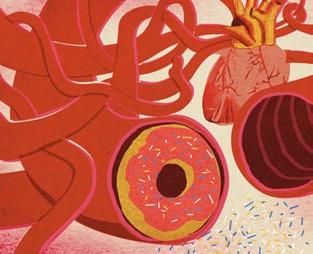
works on an enzyme in the liver to stop bad cholesterol from being made. Most people will take a statin for the rest of their lives.
WHAT CAN THE PATIENT DO?
The first step to reduce your cholesterol yourself is to ensure you’re eating a healthy diet, including lots of vegetables and wholegrain cereals. People are advised to cut out or drastically reduce fatty cuts of meat, butter, ghee, lard, cream, cheese, biscuits, cakes, chocolate and types of cooking oil such as coconut or palm oil. Taking regular exercise and stopping smoking will also have a big impact.
ILLUSTRATION
| 01•2018 56 HEALTH
BY DAVID HUMPHRIES
Immunace® has been developed by Vitabiotics’ experts in micronutrients to help maintain all-round health and vitality. Including vitamins D, C, zinc and selenium which contribute to the normal function of your immune system.
Immunace® Extra Protection is an advanced formula that includes all the benefits of Immunace® Original plus more, with 1000 IU vitamin D.



GB ScanTrack Total Coverage Unit Sales 52 w/e 26 March 2016. ORIGINAL EXTRA PROTECTION YOUR IMMUNE SYSTEM'S normal function is supported by vitamins D, C, zinc and selenium ADIMMCONP 17-06-16E Britain’s No.1 Vitamin Company* From Superdrug, Holland & Barrett, Waitrose, Lloydspharmacy, chemists, health stores & www.immunace.com
*Nielsen
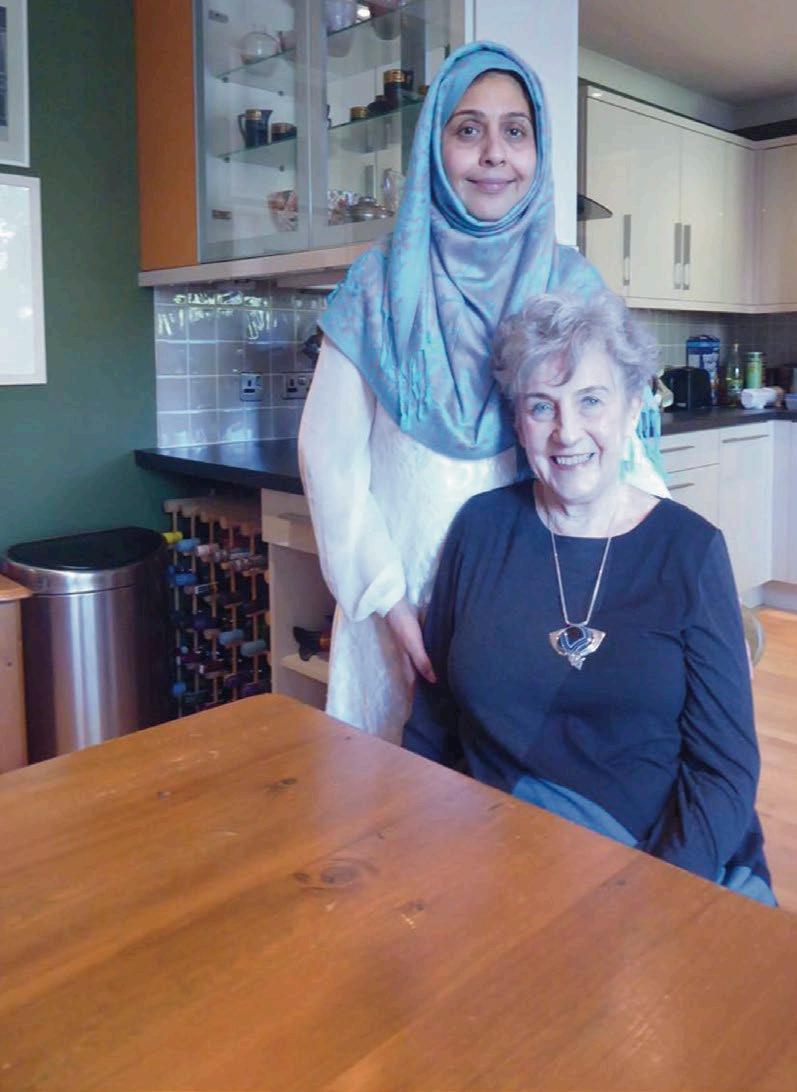
More than 65 million people are forcibly displaced worldwide—of those, 22.5 million have become refugees. Seventeen per cent of those people come to Europe, and Glasgow-based charity Positive Action in Housing is helping them to find shelter. Anna Walker met the volunteers opening their homes and their hearts to refugees
INSPIRE

Living With REFUGEES
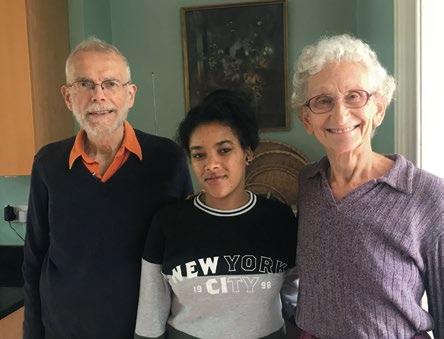

59
@ ANNA WALKER / COOKIE SAMI / ABRAMS
LEN AND KAREN ABRAMS, HOSTING GRACE, 36, FROM MALAWI IN CATERHAM, SURREY
FOR LEN, an ordained priest and civil engineer and his librarian wife Karen, the time to act came when the photo of Alan Kurdi—the three-year-old Syrian refugee washed up on Turkish shores—hit the papers.
“It seemed such a terrible situation,” Karen recalls. “One feels so powerless. I thought hosting could be a small way of helping because the crisis is so overwhelming you just wonder, What can I do?”
The couple was initially matched up with a young man from Afghanistan. He arrived in Surrey with nothing more than a plastic packet, which contained all his worldly possessions.
“He was a Muslim, so on the afternoon of his arrival you’d have found me in my dog collar hunting all over for Halal food,” laughs Len, who also downloaded a Qibla app to show their guest the direction to Mecca.
“Growing up in Afghanistan there was a lot of talk of the evil West, but he told us that those two gestures ended 18 years of propaganda.
“When folk come into your home from that sort of environment, you suddenly see all your stuff through other people’s eyes,” Len explains. “It makes you revalue it all. We’ve been at least as blessed by having folk here as they are being here.”
Having found their first experience so rewarding, the couple are now hosting their second guest. Grace is an upbeat 36-year-old from Malawi, with an irrepressibly contagious laugh and obvious affection for her hosts and the home they share.
“Hosting is the best thing anyone has done for me,” she explains. “When I was living on my own, I felt like I was always running, but now I have a place to stay, I am free.”
“Our two adult children have left now,” says Len, “So there’s only two of us in this great big house and it’s nice for Karen to have company, because I often travel for work.”
HOSTING IS THE BEST THING ANYONE HAS DONE FOR ME. WHEN I WAS ALONE I FELT LIKE I WAS ALWAYS RUNNING, BUT NOW I AM FREE
Indeed, in Len’s absence Karen and Grace have taken excursions to Penshurst Place, enjoyed walks in the forest and even taken a day trip to London’s Globe Theatre.
“We bought tickets to see Much Ado About Nothing—I can never persuade Len to go—and it was a beautiful day,” Karen shares.
Before Grace signed up to the refugee-hosting programme, she was
60 | 01•2018 LIVING WITH REFUGEES
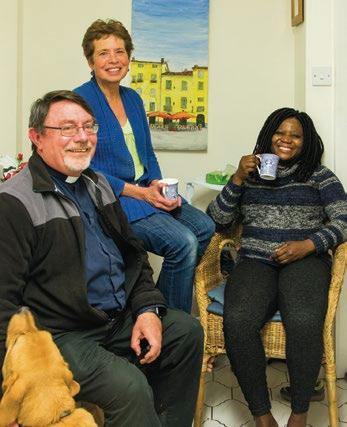
homeless for three months, sleeping in parks, shopping centres and even on buses.
“I had friends. A lot of friends. But when I became homeless I saw their true colours. My heart was broken. The moment you become homeless your friends turn their phones off, they say they’re always busy. It’s just another way for them to say, ‘Don’t call me back.’
“Sometimes, when they see you arriving, they will hide their things. Just because you no longer have a job [Grace lost her right to work because of her asylum-seeker status] they think, This one doesn’t have money, she’s going to steal from me.”
Grace discovered Positive Action through a friend, who dragged her across London in an effort to sign her up. Although she was desperate to find shelter so that she could continue volunteering (Grace’s volunteering
has seen her receive an award from the Mayor of London and meet Prince Harry), she was initially nervous to meet the Abrams family.
“When I met Len and Karen for the first time and realised that they were such lovely people, the fear went right away.
“You have to trust in your hosts and ask, ‘God, please be with me, help me trust this family.’ It’s hard for someone to offer you a place free of charge. Out of 100, there are very few people who would open their houses to those who don’t have anywhere to stay.”
Karen is keen to explain how much the couple’s faith has deepened through their relationship with their guest.
“Grace has such a positive spirit and her faith is so strong despite difficult circumstances. She’s been such a good influence on other people, using her talents to help in so many ways.”
Says Len, “My brother-in-law recently said, ‘You’re doing something that I respect, but I could never do it myself’. I think most people probably think hosting is a relationship of condescendence and charity, but that just wouldn’t work. You have to have respect. It has to be a mutual relationship.
“Rather than seeing it as an act of duty or conscience, know that [in not hosting] you’re actually just missing out on an enormous blessing.”
01•2018 | 61 READER’S DIGEST
Len and Karen describe Grace as “part of the family”
CLAIRE AND ROBERT MILNE, HOSTING MERON, 21, FROM ERITREA IN CENTRAL LONDON
“
MY FAMILY ON BOTH SIDES
WERE originally Jews in Eastern Europe, which wasn’t a very good place for Jews to be,” explains telecoms consultant Claire Milne. “Because of my background I’ve always been very aware of the needs of people who can’t stay in their own countries. I wouldn’t exist if my parents and grandparents hadn’t moved around the world, so I know how important it is and always felt it would be nice to help people in that situation.”
The opportunity to help arose for Claire, 66, and her husband Robert,
69, who first met while studying at Cambridge 42 years ago, when their youngest child flew the nest.
“He completed his PhD studies and decided the time had come for some independence. That meant we had extra space, and it was the perfect time to offer it to someone in need.”
Twenty-one-year-old Meron, who had to flee her home country Eritrea due to religious persecution, is the third guest the Milnes have hosted and moved in in July last year. Meron is shy and chooses her few words carefully, but she clearly feels safe around Claire. She explains that on her first day with the Milnes, “I felt better. I like it here. I like the freedom.”
“Meron is incredibly self reliant. She’s without family here, and had to leave her husband behind back in
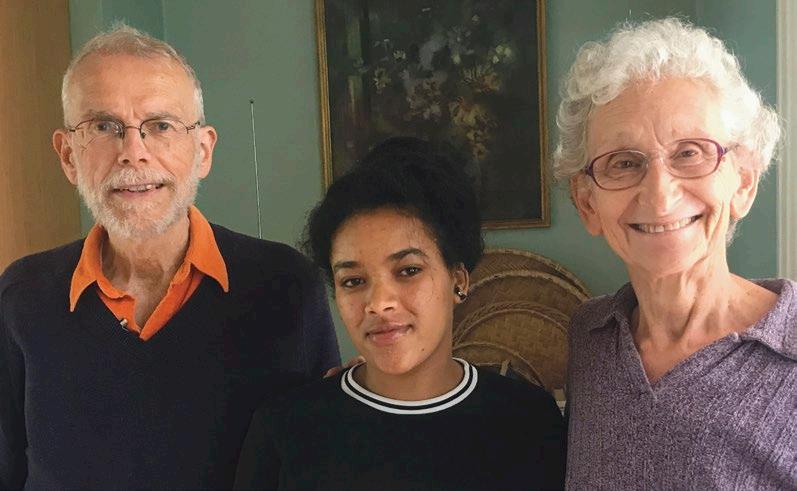
Claire and
felt able to host refugees when their youngest son left home
LIVING WITH REFUGEES
Robert
Africa. She doesn’t know where he is, which must be such a terrible wrench,” explains Claire.
Meron has joined a church in London, where she can practise her Pentecostal Christian faith free of the persecution so many suffer in her homeland, and has made friends with some fellow Eritreans there. She explains that it’s important for her to have friends who understand where she has come from.
“Our first guest was a young Muslim gent from Sudan,” says Claire. “He was here during Ramadan, and although I’ve visited Muslim countries during Ramadan, I’ve never lived with somebody actually keeping it. It was like having somebody in hibernation for the whole period, I was quite worried about him!”
This concern is typical of Claire, who clearly takes a maternal approach to her care for the refugees who stay in her home.
“I’ve noticed that Meron often calls me ‘Mummy’ and I guess that I am a sort of mother figure to her. It’s not so different to how it was when my son was living here. He was independent and out a lot but he knew he could always come and see me if he wanted to. I hope it’s the same for Meron.”
Coming from Eritrea, where the average temperature in January is a pleasant 22C, Meron explains that the English winters are something she’s struggled to adapt to in the two years she’s been in London.
The hallway to the Milnes’ home is lined with packages that Claire reveals are full of pieces of transparent plastic. She intends to line the windows of Meron’s room—a cosy space with her own kitchenette— while she’s at church on Sunday, to help keep the warmth in when the colder months roll around.
“Hosting is a big responsibility,” Claire admits, “but it feels so worthwhile for anyone who’s like us and has some space to spare that they don’t need to make money out of.
I
WOULDN’T EXIST IF MY PARENTS AND GRANDPARENTS HADN’T BEEN ABLE TO MOVE AROUND THE WORLD
“I think it’s wrong that there are homes for these people only thanks to volunteers. Hosting isn’t like taking anybody from a homeless shelter in, because homeless people in this country often have some sort of problem like drug abuse, or difficult family backgrounds, which I wouldn’t feel capable of helping with.
“Refugees, however, are just like anybody else. They don’t need anything more than the support that an ordinary family can give.”
01•2018 | 63
READER’S DIGEST
JO HAYTHORNTHWAITE, HOSTING NABEELA, 51, FROM PAKISTAN IN GLASGOW, SCOTLAND
AT 79, RETIRED ACADEMIC JO
HAYTHORNTHWAITE has been sharing her home with destitute refugee women for over ten years. Fifty-one-year-old Nabeela is her eleventh guest.
“One day I was walking past a newspaper stand and I saw a copy of The Daily Mail with a very nasty, pejorative, anti-refugee headline and it made me so angry.
“I wanted to do something. Offering a room is my small contribution to try and make things a bit better.”
Nabeela first arrived in Scotland in 2010. “I had a problem and couldn’t go back to Pakistan. I went back once, in 2014, but the problems were worse and my husband said I shouldn’t stay. I said ‘OK.’ So I was alone here, with no home.”
Eventually she was brought to Jo. Finding reliable shelter—they’ve now been living together for two years—
was an immense relief. “I thanked God. I’m so comfortable here. There’s no problem sleeping, working, going out and coming home. I am happy.”
“Nabeela is a sensitive guest,” Jo explains. “She’s very thoughtful and helpful so that makes it easy.
“Before I hosted I thought about it long and hard. I wanted to retain my privacy. I didn’t want to share my life with somebody. Nabeela and I have separate lives and that suits us both.”
Nabeela’s days are largely taken up with English classes—a study she takes seriously because she didn’t speak a word before she arrived in the country. “I was blind the first time I came here. It was difficult—I thought, Oh my gosh, this is too much. My life is full of problems, but manage for yourself, Nabeela, please.
“I would spend every day going to classes. In one place a class would finish and I’d go off to another place and then another one, because I needed further lessons. It’s getting better now. If I don’t go to classes, I spend too much time thinking and that doesn’t feel good. Wondering why I’m here, feeling alone…”
BEFORE I HOSTED I THOUGHT LONG AND HARD. I WANTED TO RETAIN MY PRIVACY
Despite this busy schedule, she also finds time for singing in a choir and her passion—charity shopping.
“Whenever she has a tiny bit of money, Nabeela is very good at finding bargains,” Jo divulges. “She’ll come in and say, ‘Look what I’ve got!’ ” She waves her arms to demonstrate, “ ‘I only paid £1.95 for this!’ ”
64 | 01•2018 LIVING WITH REFUGEES
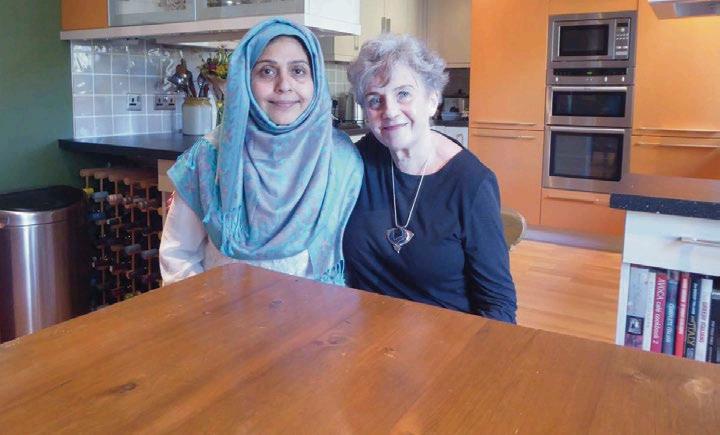
Nabeela’s eye for shopping has fuelled another passion—helping others.
“Yesterday I helped a Syrian woman. She doesn’t understand English, she’s pregnant and she’s alone here. She needed clothes, so I said, ‘OK,’ and when I came home I put a jacket, scarf, socks and everything in a bag and gave them to her. I help as many people as I can.”
In the years she’s hosted women in need, Jo’s neighbours have supported her by donating clothes and furniture.
In fact, the neighbours saved the day when Nabeela was detained at Yarl’s Wood Immigration Removal Centre for three months, and Jo needed to travel to stand her bail.
“I told them, ‘The travel is going to be a bit expensive and I wondered if
you’d help me with ten pounds each?’ And they all did! Except for one man, who’s a bit of a wind-up merchant. He said, ‘Jo, I’m not going to give you ten pounds. I’m going to pay your airfare.’ ” They both giggle.
Eight years on from her first arrival in the UK, Nabeela’s favourite thing about Scotland is somewhat surprising.
“Snow!” she exclaims, her eyes lighting up at the thought. “I love the snow, I love the winter here.”
“And I hate it,” chirps Jo, laughing. “She’s out there dancing in the snow and I’m inside turning up the heat!”
For more information on Positive Action in Housing, to donate or to volunteer your own spare room, visit paih.org
01•2018 | 65 READER’S DIGEST
Nabeela was relieved to be matched with Jo because she felt “my life was safe”
Twiggy, 68, is a model, singer, writer, presenter, designer and award-winning actress, whose extraordinary career has spanned more than five decades
If I Ruled the World Twiggy
I’d wave a magic wand and make sure no child anywhere ever went hungry. This is the most fundamentally important thing in the world.
Glass bottles would replace plastic ones. Glass is easily recyclable and it breaks down. But the statistics around plastic waste are horrific: each year over 8 million tons of plastic end up in our oceans. At this rate, by 2050 the amount of plastic will outweigh the amount of fish. How did we get to this?


Plastic use has increased 20-fold in the last 50 years and our sea life mistake it for food. I’d ask people to think hard before buying plastic bottles or anything in excessive packaging.
At least one pet in each household would be a rescue animal. I’d outlaw puppy farms, give much harder sentences to people who inflict cruelty to animals and encourage people to give a home to an

INSPIRE | 01•2018 66
ILLUSTRATED BY
/ @
JAMES SMITH
BRIAN ARIS
abandoned or unwanted pet. I do a lot for animal charities—they do such important work.
Home economics would go back on the school curriculum. I was taught to sew by my mum—she made our clothes—and now I’m a good seamstress. Every child should at least be able to sew on a button or turn up a hem. Just like knowing how to change a fuse or cook, these are vital life lessons that make you a better equipped person and more helpful partner in later life.
We’d wear clothes that make us feel good. I love designing for M&S because they make clothes that are fun, stylish and affordable. We’re really lucky in the UK to have such great high-street shops, which allow us to dress well without spending a fortune. You can always spot people who are wearing something they love —they have a different attitude and confidence about them, which will make their day that little bit easier.
Elderly people living alone would have a visitor every day. Loneliness is a chronic problem in our society. I’m as guilty as anyone else in feeling I’m too busy to make a difference, but we should all be aware that the elderly need the hand of friendship extended to them. I watched a wonderful documentary recently about a nursery school moving into
an old people’s home. It was marvellous to see the older people rolling around on the floor with the children and having a laugh together.
We’d be brave and follow our dreams. If you don’t try when you’re young you might live to regret it. I’ve known people in my life who were really passionate about something— such as playing the guitar, singing or painting—but ended up in business to make money. There comes a point in their lives when they wonder, What might have happened if I’d had the courage to follow my dreams?
I’d ban big lorries on roads during the day. They terrify me on the motorways and in the cities they clog up the traffic and are dangerous to other drivers, pedestrians and cyclists. I’d make better use of our amazing and underused canal system for goods that don’t need to be delivered immediately.
I’d make my granddaughter happy by holding a National Tutu Day. Joni is two and a half and she’s my joy. She likes to wear a tutu every day, so imagine her delight if one day every person she met was wearing a tutu as well—a pink one, of course. As told to Caroline Hutton
Twiggy For M&S Collection is available in selected stores and at marksandspencer. co.uk
01•2018 | 67
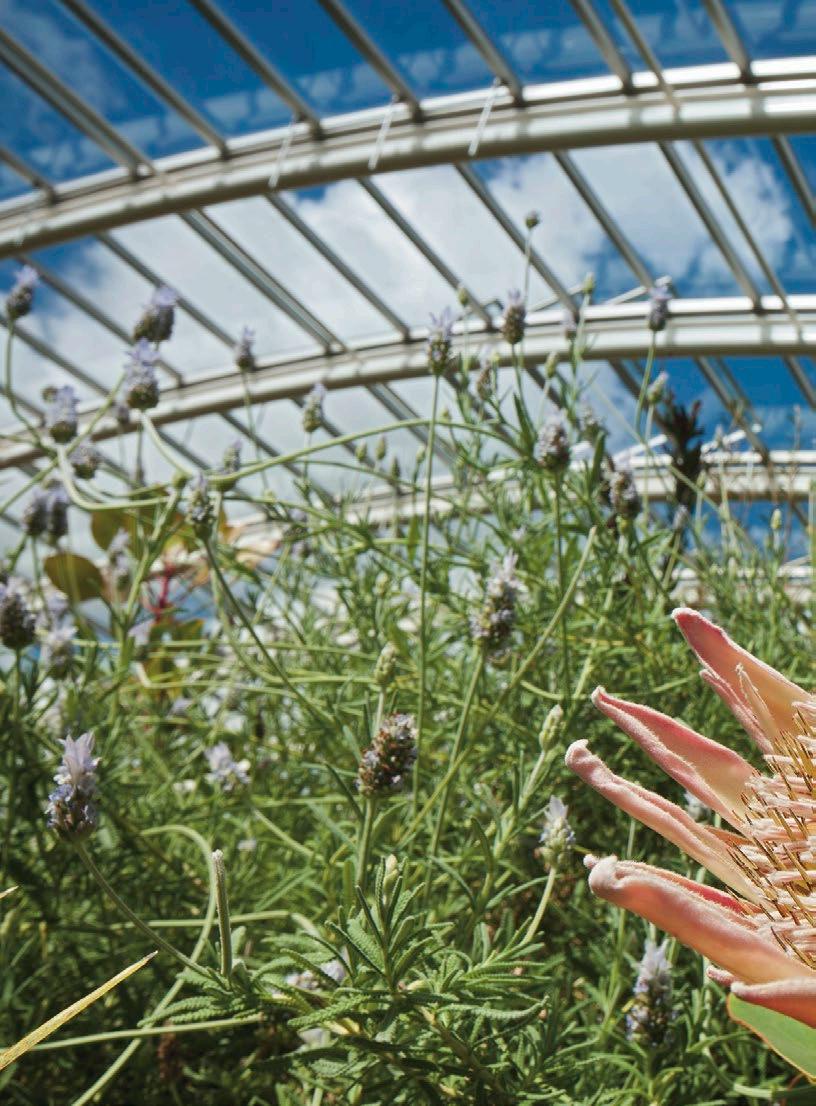
Indoor GARDENS
Forget the winter blues with these colourful indoor gardens…the perfect escape from the chill
BY ANNA WALKER
BEST OF British
INSPIRE
 The Great Glasshouse, National Botanic Garden of Wales
The Great Glasshouse, National Botanic Garden of Wales
The Great Glasshouse
NATIONAL BOTANIC GARDEN OF WALES
Designed by the prestigious architect Norman Foster, the Great Glasshouse was originally designed to resemble a giant raindrop.
With 785 panels weighing in at a quarter of a ton each, it’s the world’s largest single-span glasshouse and hosts plants from California, Australia, the Canary Islands, South Africa, Chile and the Mediterranean. Despite covering less than two per cent of the Earth’s surface, these areas contain over 20 per cent of all known flowering plants. It’s a fact head of marketing David Hardy finds easy to remember because, “That’s where all the good red wine comes from!”
David’s favourite plants in the garden couldn’t be more different.
“
Puya berteroniana is a vicious razorsharp, spiked llama-killer from the Andes. Phylica pubescens, on the other hand, looks like the fluffiest thing you’ve ever seen—until you touch it, that is. Then you know it is.”
■ Visit botanicgarden.wales for more information

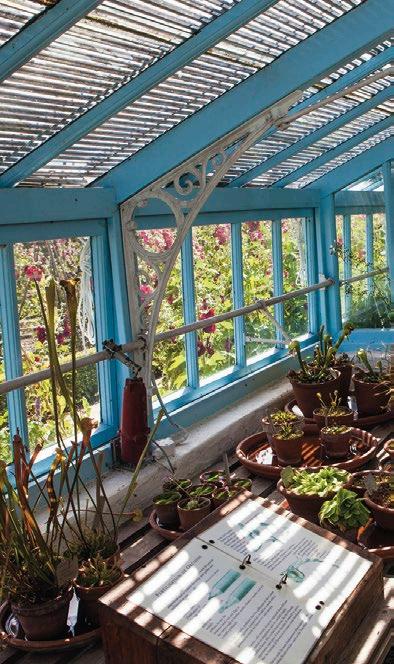
Down House DOWNE, KENT
Tucked away in the green grounds of Down House, the former home of Charles Darwin and his family, is a small but significant blue glasshouse that proved vital to some of the naturalist’s discoveries.
Charles Darwin first tried to rear tropical plants in his drawing room but the space was too small and too cold, so the specimens failed to bloom. To solve the problem, he built this quirky glasshouse in the early
BEST OF BRITISH
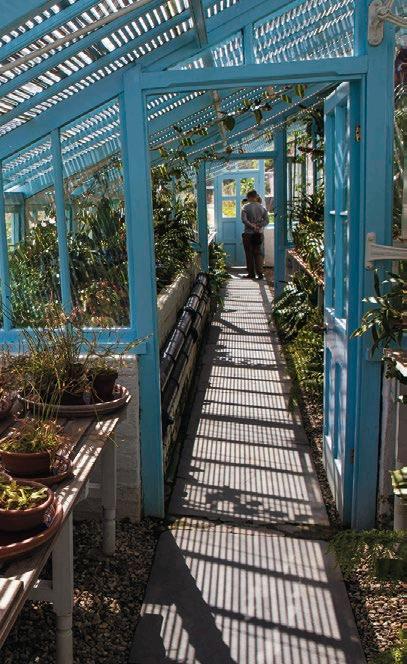

1860s and took to the serious business of rearing and experimenting with the specimens he brought home from his many trips abroad.
Says head gardener Antony O’Rourke, “Visitors can step back in time and walk in the footsteps of
Thanks to Darwin’s meticulous note-taking, staff at Down House have been able to grow the very same plants he once cultivated
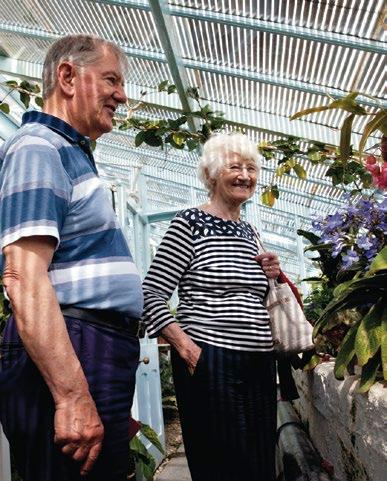
the great man himself through a series of themed plant collections including orchids, carnivorous and climbing plants.”
Keep an eye out for the impressive collection of insectivorous plants, which Darwin was particularly fascinated by. He used to feed them with raw meat and egg whites—and even his own nail clippings.
■ Visit english-heritage.org.uk for more information
01•2018 | 71 READER’S DIGEST
David Welch Winter Garden
DUTHIE PARK, ABERDEEN
This unique indoor garden is home to such intriguing highlights as the corridor of perfumes and the world’s only “talking cactus”.
Boasting Britain’s largest cacti and succulent collection, the gardens were the passion project of the late horticulturist and head of the Royal Parks, David Welch. He was the man responsible for casting out the officious “Keep off the Grass” signs in all of the Royal Parks and his Winter Garden is a testament to his belief that gardens are to be experienced, not just admired from a distance.
No matter where your eye wanders in this garden, it’s met with a shock of colour, as lush greens combine with the explosive fuchsia of the extensive Bromeliad plantings. Even the ponds are filled with colourful fish and terrapins.
Round off your visit with a trip to the nearby Japanese Garden. It was opened in 1987 to pay homage to the victims of Hiroshima and Nagasaki.


Kibble Palace
GLASGOW BOTANIC GARDENS
First erected by Victorian eccentric and inventor John Kibble, this magnificent glass and steel greenhouse first opened in 1873. Back then its interior was lit by over 600 coloured gas lamps, and the venue played host to a smorgasbord of public speakers including former Prime Ministers Gladstone and Disraeli.
Today it’s home to a forest of Kiwi and Australian tree ferns, some of which have grown in the palace for an impressive 120 years.
A peaceful haven in the heart of Glasgow, these engrossing gardens are the perfect place to unwind, whether you’re gazing at the colourful collection of koi fish or sheltering from the cold spells outside.
■ Visit glasgowbotanicgardens. com for more information
BEST OF BRITISH
PHOTO /
NICK KIRK/ALAMY STOCK
SHUTTERSTOCK



Sheffield Winter Garden SHEFFIELD
Europe’s largest urban glasshouse is so big that you could house 5,000 domestic greenhouses within its walls. Home to more than 2,500 plant varieties from around the world, it’s an oasis of calm in the middle of the busy city centre.
Visitors can relax under the large green leaves of the plants, enjoy some light refreshments from the on-site cafes or browse the Millennium Gallery housed inside. It’s an especially welcome escape when the weather turns inclement— with so many exotic plants around, it’s easy to forget the rain beating down outside.
Says service manager Dave Gill, “Winter Garden is an iconic Sheffield landmark. The garden tells the story of how plants have shaped our history and the uses humans have found for them. Quite literally, without plants you wouldn’t have a shirt on your back.”
Look out for the Norfolk Island pines, which can grow to over 150ft!
■ Visit sheffield.gov.uk for more information
01•2018 | 73
The Bicentenary Glasshouse SURREY
With three zones to explore— tropical, moist temperate and dry temperate—stepping into this huge indoor garden feels as though you’ve stumbled upon an undiscovered jungle.
Stretching over an area the size of ten tennis courts, many of the species growing in this cathedral-esque structure are rare or endangered—special plants that are made all the more spectacular by the backdrop of several dramatic waterfalls.
Says garden manager Emma
Allen, “Rising to 12 metres high, the glasshouse is computercontrolled to maintain desired levels of light, heat and ventilation. This allows us to grow both tropical and temperate plants including large palm trees, bananas and tree ferns, as well as creative temporary displays. There’s always something new and exciting to see.”
Our favourite area is the tropical zone, where the viewing platform affords visitors a bird’s eye view of the tropical canopy, right down to the aquatic plants of the warm jungle pool below.
■ Visit rhs.org.uk for more information


TIM GAINEY/ALAMY STOCK PHOTO / CLINT BUDD/FLICKR
The Bicentenary Glasshouse at Wisley Garden was opened in 2007 to celebrate the 200th year of the Royal Horticultural Society
The Barbican Conservatory
LONDON
Central London may not be the first location that springs to mind when thinking of all things green, but nestled away among the Brutalist concrete exterior of the Barbican Centre is a lush indoor conservatory. Free to visit, this is the second largest conservatory in London and home to over 2,000 species of tropical plants and trees, as well as a variety of exotic fish.
Says Marta Lowcewicz, a gardener at the Conservatory, “People are always amazed by the unexpected sight of the leafy, verdant environment when entering the Conservatory. One of the many discoveries that can be made while exploring the space are coffee and tea plants, allowing visitors to see the origin of their favourite morning brew while immersing themselves in the tranquil ambience.”
■ Visit barbican.org.uk for more information

Which gardens do you visit when the weather turns? Email us at readersletters@readersdigest.co.uk

READER’S DIGEST 01•2018 | 75 NATHANIEL NOIR/ALAMY STOCK PHOTO
The stories are pouring in, and there’s still time to enter yours! Here’s another tale that might ignite an idea... Competition
WIN
£1,000!
All shortlisted stories will be published in a special anthology by Lulu.com
PLUS: Winners will have the chance to include a longer version of theirs!
See opposite for how to enter
INSPIRE
100-Word-Story
Hounded
by Laura Purcell
I WORRIED ABOUT HER, AFTER IT HAPPENED. The hunted look of one who could not forget. Their vows to make her pay, one way or another. She needed company, in that house. But the tang of his unwashed fur turned my stomach. An ugly beast; black, always at her heel. An odd choice, with those fangs and fierce eyes. Perhaps he made her feel safe.
“It wasn’t your fault that they died,” I said, giving her a hug. The dog growled. Foam flecked his lips. “Ghosts aren’t real, your dog will protect you.”
“I don’t have a dog,” she said.
The Silent Companions by Laura Purcell is out now, published by Raven Books at £12.99

Rules: Please ensure that submissions are original, not previously published and exactly 100 words long (not including the title). Don’t forget to include your full name, address, email and daytime phone number when filling in the form. We may use entries in all print and electronic media. Contributions become world copyright of Reader’s Digest

Entry is open only to residents of the UK, Channel Islands, Isle of Man and Republic of Ireland. It is not open to employees of Vivat Direct Ltd (t/a Reader’s Digest), its subsidiary companies and all others associated with this competition, their immediate families and relatives living in an employee’s household. The judges’ decision is final.
Terms and conditions: There are three categories—one for adults and two categories for schools: one for children aged 12–18 and one for children under 12.
In the adults category, the winner will receive £1,000 and two runners-up will each receive £250.
In the 12–18s and under-12s categories, the winners will each receive a Fire HD 8 Tablet and
a selection of STAEDTLER products worth £50, plus two STAEDTLER classpacks of pencils for their school. The two runners-up in both categories will each receive a Kindle E-Reader.
Please submit your stories online at readersdigest.co.uk/100-word-story-competition by 5pm on February 19.
The editorial team will pick a shortlist of entries, which this year will be combined into a shortstory anthology and published by our partner lulu.com. The book will be entered into Lulu’s retail channels and promoted for one year. Winners of the categories will have an opportunity to write a longer version of their stories for inclusion in the book.
The three best stories in each category will be posted online at readersdigest.co.uk on February 27. You can vote for your favourite, and the one with the most votes wins the top prize. Voting will close at 5pm on March 19 and the winning entries will be published in our June issue. The entry forms and more details are on our website.
77
01•2018 |
In The Words Of Our Clients...
For anyone who has always wanted to write their own autobiography and has said “I’ll get round to it”, we at LifeBook are here to help. Every LifeBook author has a personal book project, whether it is their own private autobiography, or a celebration of someone special.
AUTHOR ADELE HATCHER SAYS:
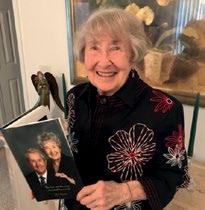
When my book arrived and I started sharing it with our children, grandchildren and great-grandchildren, the reaction was real joy. They could not put the book down until they had finished reading about their roots and my life. They now know me as a whole person, not just the one part of my life that involved them.
Having finished this story has given me a peace and joy in knowing now I will be remembered as part
of their lives and even the ones I will never live to see can read my story. I know that my life will always be a part of them in some way. I cannot express how thankful I was to know that, whatever the outcome, with the help of LifeBook, my story was finished to leave behind.
I was especially blessed to have my personal project manager overseeing my efforts and an excellent interviewer.
LifeBook is a wonderful creation and will bring great joy to many like me who want to leave behind the knowledge of life and generations for their families of the future.
PARTNERSHIP PROMOTION
CLIENT BOB PRYOR SAYS:

All throughout the many home interviews, recording the events and memories from my long life, I had wonderful support and encouragement from LifeBook, as well as from my wife, who spent many hours checking and revising each chapter and finding the relevant photographs and information for it. This process has resulted in me being presented with five beautifully handcrafted hardback books, which I can now give to my children and grandchildren. It has been the most rewarding experience and one which I can thoroughly recommend to anyone.
CLIENT BABATUNDA JALLAH EPAGA SAYS:
LifeBook is a way for someone to relate their life but it’s also for the people around them; people who are very important and part of a close-knit family. This is what my aunt has done.

It might be that you don’t get to talk to your mother or father about what they did during the war or how they felt when they were growing up because you’ve always taken it for granted.
LifeBook gives you the all answers to the many questions that, as a son, daughter, or other relative, you want to ask, things you’ve always wanted to know about. I have found from my aunt’s experience, that it really and truly brings the family together.
FOR FURTHER INFORMATION
To start your autobiography Call us on 0800 999 2280 Or email us at digest@lifebookuk.com

Chatter Snap, Pop &
Many social scientists now believe that cultivating the right kind of popularity is the key to greater happiness—and even a longer life
BY AMANDA RILEY-JONES
INSPIRE
80

Does the subject of popularity make you think of social hierarchies at school and younger family members collecting “Friends” on social networking sites? Then you may be surprised to find out that popularity actually remains a powerful force throughout our lives.
In the 1980s, developmental psychologists asked children to rate how much they liked or disliked their classmates. The responses were used to classify them into categories, which are still used today: Popular; Rejected; Average, Controversial (both liked and disliked) and Neglected (largely unnoticed).
“Often, the group we land in as adults is the same one we were in as youths. The characteristics that cause us to be accepted (or not) by peers have the potential to make us liked or disliked again and again, even as we change settings, for the rest of our lives,” explains Mitch Prinstein, psychology professor and author of Popular: Why Being Liked Is the Secret to Greater Success and Happiness.
“Results from thousands of research studies have revealed that—more than childhood intellect, family background, prior psychological symptoms and maternal relationships—it’s popularity that predicts how happy we grow up to be.”
However, popularity is something
of a paradox. Because it turns out that there’s more than one kind— and if we spend our lives chasing the wrong type, we could be heading for trouble.
Perpetual adolescence
The first type of popularity is to do with status—which we start to crave when we hit adolescence. Our brains grow faster and a surge in pubertal hormones prepares us to separate from our parents and focus more on peers. Oxytocin increases our desire to bond and dopamine makes us want to be noticed and admired.
“Adolescents are virtually addicted to this type of popularity,” Prinstein adds. But, he warns, when people continue to pursue this status-based popularity excessively, they’re more likely to suffer from relationship difficulties, anxiety, depression and addictions later in life. Prinstein says, “Because their happiness remains dependent on other peoples’ approval, they tend to repeat the same patterns and may face a lifetime of discontent.
“In today’s society, our higheststatus peers are celebrities and our fascination with them leaves us in a state of perpetual adolescence.
| 01•2018 82 SNAP, CHATTER & POP

We care about their lives, changes in physical appearance, courtships and break-ups just as intently as we paid attention to the popular teens in school.”
Prinstein’s worried by modern society’s fixation on status, fame, power and wealth, saying, “We pay too much heed to people who capture our attention rather than those who deserve it—even though research suggests this is exactly what we should be avoiding if we want to foster a culture of contentment.”
Likeability predicts our fate
The second kind of popularity is likeability, which embraces qualities such as positivity, kindness, generosity and making other people feel valued. Increasingly experts are
discovering that it’s our ability to get on with others that predicts our fate in many areas of life.
Study after study confirms that people who look for “intrinsic” rewards (to do with close relationships, A CHIMP’S LIFE
Ethologist and conservationist
Jane Goodall discovered that behaviour once thought uniquely human is common in other species. Chimpanzees use status and aggressive behaviour to establish dominance and popularity—which gives them first pick at food and mates.
01•2018 | 83
helping others and personal growth) report greater happiness than those looking for external rewards (such as fame, power and wealth).
“My own research, involving 9,000 people from 131 countries, revealed that adults who have memories of being popular in childhood are the most likely to report that their

IT ALTERS OUR DNA
Believe it or not, feeling unpopular can alter our very DNA. Within 40 minutes of being left by a romantic partner or excluded from a social event, parts of our DNA are turned on or off, according to experts in the field of social genomics.
These cellular-level changes activate a response linked to our immune system, which is needed for healing wounds and infections.
George Slavich and Steven Cole, psychological researchers at the University of California, have suggested that this response to rejection may be nature’s way of protecting isolated individuals without peers to defend them.
marriages are happier, their work relationships stronger and that they’re flourishing as members of society,” says Prinstein.
And picking out likeable peers is child’s play. Research shows that from the age of four, children can report exactly who their most popular peers are. They’re not necessarily powerful, dominant or highly visible; they’re simply the kids that everyone likes the most.
So lonely I could die
When it comes to our health, being unpopular or lonely can have a devastating impact—to the point of shortening our lives. Last year, Dr Helen Stokes-Lampard, head of the Royal College of General Practitioners, announced that loneliness can be as bad for our health as a long-term illness, such as diabetes or high blood pressure.
“Loneliness is worse for us than obesity and physical inactivity, and as bad as smoking 15 cigarettes a day. Chronic loneliness increases the likelihood of early mortality by 26 per cent,” adds Laura AlcockFerguson, executive director of the UK’s Campaign to End Loneliness.
Friends are good for our hearts
Friends protect our health as much as quitting smoking and even more than exercising, according to US scientific journal PLOS One.
| 01•2018 84
SNAP, CHATTER & POP
“Strong social relationships support mental health—and that ties into better immune function, reduced stress and less cardiovascular disease,” reports Dr Debra Umberson, a professor of sociology at the University of Texas, who has studied the link between social ties and health.
Apart from being more likely to exercise or diet if we do it with a friend, loved ones may also remind us to look after our health or even intervene if we go off the rails, by drinking too much for instance.
She adds, “Research has also found that physical touch can trigger lower blood pressure and reduced heart rate. Over time, these will have a cumulative benefit on overall health and lifespan.”

HAPPY HOURS
Entrepreneur Daniel Clemens, a former senior manager at Google, adds, “More than raises, promotions or perks, there were two things that predicted who was happy and who was not. One had to do with the frequency of constructive feedback employees got from their managers. But the second was simply how much people felt they had someone—anyone —who liked them.”
It’s never too late
Prinstein concludes, “I hope people will reconsider their childhood experiences and see that the type of popularity that they felt they lacked may not have been all that it seemed. Try to recognise how popularity (or unpopularity) has contributed to biases in how you perceive social interactions today—and remember that people are reacting to who they see today, not who you were in the past.”
Another positive is that likeability isn’t fixed. It’s not just something we are born with. Experts say that the behaviours that make us likeable can be learned at any age. It’s never too late to hone our people skills, expand our social network and start relating better to others.
READER’S DIGEST 01•2018 | 85
8 Ways To Pep Up
Here’s a round-up of advice from the scientists:
1SPEND TIME WITH PEOPLE YOU WANT TO BEFRIEND
Psychologists say that people tend to like people who are familiar to them—according to the “mere exposure effect”. Canadian psychologist Dr Patrick Keelan explains, “It’s a response built into us as a result of our evolutionary past, when people were more likely to survive if they approached people and other creatures only once they had determined they were nonthreatening.” So schedule regular activities with others and the more time you spend together, the more you will grow to like each other.
2
TALK POSITIVELY ABOUT OTHER PEOPLE
Try a little “spontaneous trait transference”. When you talk about another person, listeners unconsciously associate you with the characteristics you’re describing. “So, say positive and pleasant things about friends and colleagues, and you are seen as a nice person,”

advises Professor Richard Wiseman in his book 59 Seconds: Think a Little, Change a Lot.
3
ASK LOTS OF QUESTIONS
Harvard neuroscientists Diana Tamir and Jason Mitchell discovered that talking about ourselves triggers the same pleasure chemicals in the brain as food or money. In fact, participants were willing to forgo money in order to talk about themselves! And try specific questions such as, “Have you been involved in any exciting projects recently?” rather than a bland, “How are you?”.
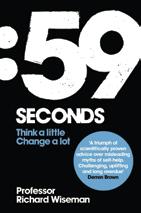
4STAY UPBEAT
Moods are contagious— and the transmission from one person to another is
| 01•2018 86
SNAP, CHATTER & POP
Your Popularity
so instant and subtle that we’re not aware of it, according to Elaine Hatfield, professor of psychology at the University of Hawaii. If you can stay upbeat and positive, people around you will become more upbeat too. And being in sync helps to build emotional rapport.
5FIND THINGS IN COMMON
Who doesn’t like to talk to someone and think, Snap, me too! Scientists call this the similarityattraction effect. In a classic study, social psychologist Theodore Newcomb measured participants’ attitudes on controversial subjects before they moved into shared accommodation together. Unsurprisingly, the experiment showed that the housemates with similar attitudes liked each other more.
6SHARE A SECRET
Self-disclosure can help build a friendship. US researchers put students into pairs with pre-set questions to ask each other. The pairs who were given deeper, more personal questions reported
they felt much closer to each other at the end. When you’re getting to know someone, try building up from asking easy questions (like the last book they read) to something more meaningful —such as the people who mean the most to them in life.
7USE THE POWER OF TOUCH
An appropriate friendly touch (whether it’s a warm handshake, light touch on the arm or full-on hug) increases the release of the hormone oxytocin, which promotes a sense of trust and a slew of other good feelings that make us feel close to one another.

BEHAVE LIKE YOU LIKE THEM
According to the “reciprocity of liking” phenomenon, when we act like we like someone, they will probably like us back. Researchers at the University of Waterloo and the University of Manitoba discovered that we behave more warmly when we expect people to accept us—which ups the chances that they really will like us!
01•2018 | 87 READER’S DIGEST



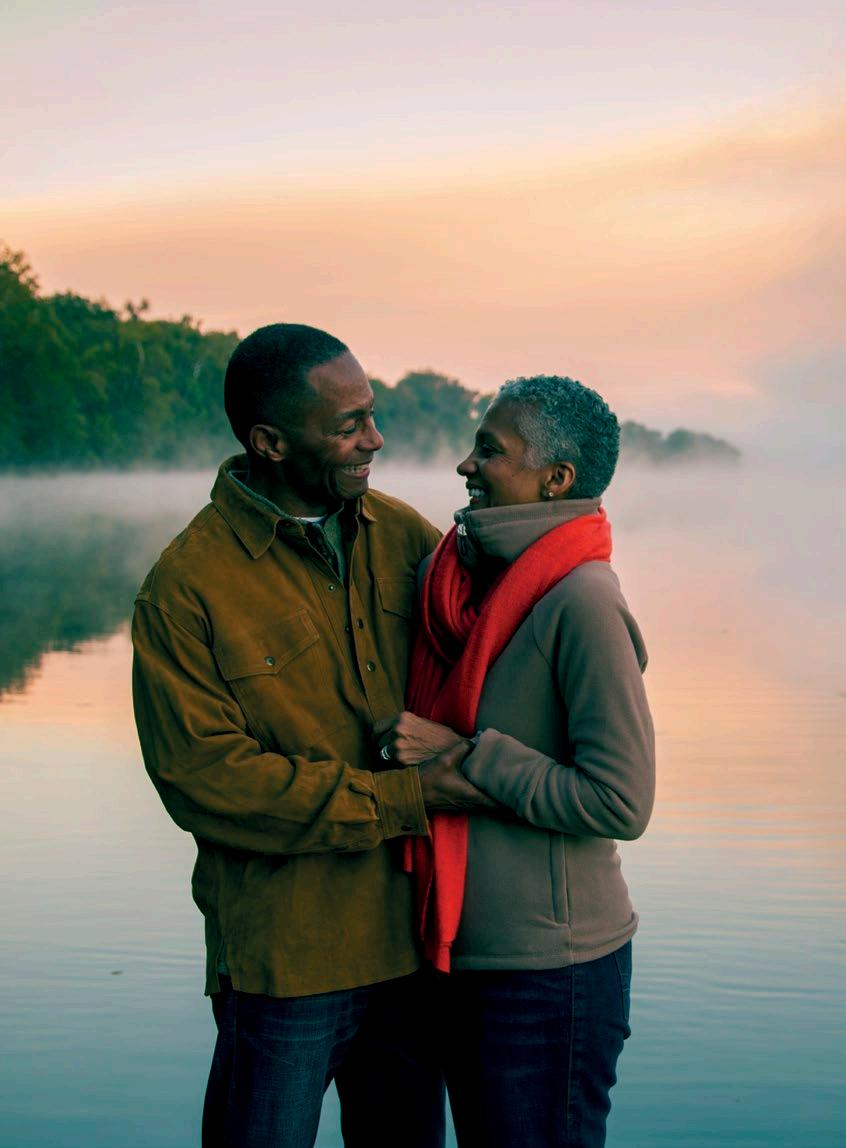
Reader’s Digest Dating is a safe and secure way to meet a likeminded companion. Specifically designed for singles over 40 who love life and want someone to share it with.
It’s free to join and you can sign up in 3 simple steps.
Reader's Digest FIND A LIFE COMPANION WITH readersdigestdating.co.uk
HONG KONG 20 YEARS LATER

It’s been more than two decades since Britain handed over Hong Kong to China. Our writer, a former resident, returned to find the city as vibrant—and quirky—as ever
BY BONNIE MUNDAY
Hong Kong Island, as seen from Tsim Sha Tsui Promenade
PHOTO: © ALESSANDRO DELLA BELLA/KEYSTONE/REDUX
TRAVEL & ADVENTURE 89
VICTORIA HARBOUR is breathtaking, especially during the nightly laser show, when the pleasure junks, ferries and container ships seem to dance in the lights. My husband, Jules, and I are standing at the rail of a rooftop restaurant on Hong Kong Island, in awe of the spectacular skyline. Brightly lit skyscrapers—some 1,300 of which are over 100 metres tall, by far the most of any city in the world— spike the night sky around us and across the teeming harbour on the Kowloon peninsula.
As the breeze shifts our hair, we feel Hong Kong’s energy. In the distance twinkle the lights of the Tsing Ma suspension bridge, the world’s longest for cars and trains, whisking people toward the modern 20-year-old airport on Lantau Island.
Beyond it is a nearly completed

multi-billion-dollar bridge linking Hong Kong to Zhuhai in China, and the gambling haven of Macau.
It feels good to be back. Jules and I lived here in the 1990s, before Britain relinquished Hong Kong to China in 1997. Now, more than 20 years later, we’ve returned for ten days to see how the city has fared. It’s also our 20th wedding anniversary. Where better to celebrate it than in the city where we met?
NEXT MORNING, we leave our Causeway Bay hotel and walk toward Wan Chai, a district just over a mile away. Walking is the best way to experience Hong Kong’s colourful sights, sounds and smells. First we must negotiate throngs of Saturday shoppers in this retail mecca.
We join the sea of people in a wide pedestrian crossing on Yee Wo Street that leads us past one of the city’s largest department stores, Sogo, swathed in posters advertising designer labels. Young women sporting sleek heels and luxury handbags—a couple of them with beribboned apricot poodles tucked under an arm—are a common sight this morning.
By the time we reach Wan Chai, we’ve left the brand shoppers behind. This district is grittier than Causeway Bay, although its former reputation for girly bars has somewhat given way to shiny office towers. At Bowrington Road market, which spans a couple
1 km V I C T O R I A H A RBOUR CAUSEWAY BAY CENTRAL WAN CHAI TSIM SHA TSUI K O W L O O N H O N G K O N G I S L A N D
HONG KONG: 20 YEARS LATER 90 | 01•2018

Street markets in the Mong Kok neighbourhood of Kowloon sell food and much more of blocks, housewives are haggling loudly over meat, fish and vegetables.
Street markets are a must-see in Hong Kong, but be prepared for the smells—meat, seafood, infamously stinky durian fruit—and a little gore: I watch a vendor prove to a customer how fresh his fish is by slicing along one side, folding the fillet back and exposing the still-intact beating heart.
Nearby, beneath an overpass, we encounter a curious sight: an elderly woman chanting while she beats a paper with a shoe. A customer has written on the paper the name of a person who has upset him, we learn. Afterward, the paper is rubbed with pork fat and burned. This ritual beats the “villain” out of the customer’s life. “Only in Hong Kong,” Jules says.
Later we stop to check out the wares of a grey-haired woman hanging men’s shirts on the metal grill of an office building. As Jules peruses the shirts, I ask her, “Do you feel Hong Kong has changed under Chinese rule?”
She’s dismissive. “I’m just part of the little people,” she says. “I only want to make enough money. I don’t care if Britain or China is here.”
Other entrepreneurs we encounter seem to agree it’s business as usual. Before the handover, many people here feared Communist China would curtail the capitalism and human rights protections Hong Kong enjoyed under British rule, even though China promised self-rule—“one country, two systems”—for 50 years. But, as
PHOTO: © RICHLEGG/GETTY IMAGES
01•2018 | 91
Christine Loh, a legislator here before and after the handover, expressed in an email to me, “The degree of freedom in Hong Kong on a day-today basis remains very high.”
WE’LL HEAR a similar opinion over a lunch of dim sum—a local Cantonese specialty—in Kowloon, where we’re heading now on the Star Ferry. It’s been chugging across Victoria Harbour since 1888. The trip costs HK$2.70 (24p), a bargain in a pricey city. It’s a short walk to the vast Serenade Chinese Restaurant.
There we meet my longtime friend Junko Watanabe. With her are Ronnie and Jennifer Ho, retired teachers in their late fifties who have just moved back from Boston to their home city after 23 years. Over bamboo baskets of har gau (steamed shrimp) and siu mai (pork dumplings) and an order of yi mein (egg noodles, fried), Ronnie and Jennifer tell us they’re delighted to be home. “We haven’t noticed many changes in daily life,” Ronnie says.
Their parents had fled poverty in China for colonial Hong Kong at a young age. Ronnie’s father encouraged the couple to emigrate before 1997. “Our parents knew China was to be feared,” says Jennifer. The 1989 Tiananmen Square massacre influenced their decision to leave.
They returned to Hong Kong to be back among their family. Says Ronnie, “We’re too old to worry about politics now.”
CLEARLY, HONG KONG
is thriving. In a recent survey of the world’s cities by human resources consulting firm Mercer, it ranked sixth for infrastructure, which includes such criteria as drinking water and public transit. It ranked 71st among 231 cities for quality of life—higher than the 11 other Chinese cities included.
AT A 2014 PROTEST IN HONG KONG, MAINLANDERS WERE DENOUNCED AS ‘LOCUSTS’ EATING THE CITY’S RESOURCES
The outlook for press freedom is less encouraging: a Reporters Without Borders (RWB) survey shows Hong Kong has slipped from 18th in 2002 to 73rd today (China ranked 176th). RWB cites growing difficulty in covering sensitive stories about Hong Kong’s government and mainland China, and finds the purchase of Hong Kong media by Chinese companies “extremely disturbing”.
Another point of contention is tourism from mainland China. Before 1997 most visitors came from Japan and Taiwan, but when Beijing relaxed its rules in the early 2000s, the
92 | 01•2018 HONG KONG: 20 YEARS LATER

number of mainland visitors jumped from about 7 million per year in 2002 to 43 million by 2016.
For some locals, that’s too many; they say the visitors are rude and loud. And they blame mainlanders for the scarcity of such necessities as baby formula and medicines.
Indeed, when Jules went to buy shaving cream, he was mystified to see shop staff unloading countless boxes of baby formula onto shelves. Mainlanders snap it up due to tainted baby formula scares in China. At a 2014 protest in Hong Kong, mainlanders were denounced as “locusts” eating the city’s resources. Signs read, “Go Back to China” and “Reclaim Hong Kong”.
Late one afternoon I meet up with Mark Sharp, a South China Morning Post editor and writer since before the handover, in the seaside town of
Sai Kung, in the New Territories—the mostly rural region between Kowloon and mainland China. Over a beer ironically named Gweilo, a rude Cantonese term for “white person”, he confirms locals are more outspoken nowadays. “People worry that as more mainland Chinese come, Hong Kong will lose its identity.”
Young people, Sharp says, are especially vocal. They’re Hong Kongers first: a recent Hong Kong University survey showed that only three per cent of people aged 18–29 identify as Chinese, an all-time low since the surveys started in 1997; back then, that number was 17 per cent.
ON
A SUNNY MORNING,
we hop onto a ferry bound for Lamma Island. It’s a 30-minute trip to Yung Shue Wan village—and a world away. Although Hong Kong isn’t often associated with
PHOTO: ©SHUTTERSTOCK
01•2018 | 93
Yung Shue Wan village is just a half-hour by ferry from Central—but a world away

green spaces, there are many, and Lamma, where we lived, has some of our favorite hikes. We drop our bags at our guesthouse and walk for two hours on paths that wind down toward sandy beaches and steeply upward again.
At a hilltop pavilion, we buy refreshing pineapple slices from an old woman in a straw hat. From a nearby path we can see the fishing boats and stilted seafood restaurants of Sok Kwu Wan village below.
Walking back, we spot graves set into green slopes that face the sea for favourable feng shui. They’re tidy.
During the Ching Ming Festival two weeks earlier, families had swept loved ones’ gravesites and burned incense for departed spirits.
In Yung Shue Wan, we head to Andy’s Seafood Restaurant on Main Street and find a table with a view of the sun setting over the sea. It’s a slice of Hong Kong heaven to dine on grouper with soy sauce and ginger, and razor clams in black bean sauce.
BACK ON HONG KONG island,
we walk from the pier into Central and Sheung Wan. The walk is a few minutes longer than in the 1990s; the shoreline has shifted to accommodate new skyscrapers. One thing hasn’t changed: most highrises under construction are clad in traditional scaffolding of bamboo tied with nylon strips.
We browse antique shops along Hollywood Road and Cat Street, looking for an anniversary gift to each other. The symbol for the 20th year is, fittingly, china, and we find the perfect thing: a gold-painted teapot with wicker handles, featuring the Chinese character for doublehappiness, a wedding symbol. “It’s HK$150,” the shopkeeper says, about £15. I offer her HK$120 in cash; it’s a deal.
The wrapped treasure tucked under Jules’ arm, we pass galleries and, surprisingly, coffee shops with a hipster vibe: Winston’s, The Cupping Room, Cafe Deadend. When I lived
PHOTO: ©YEUNG MAN CHUN/SHUTTERSTOCK
94 | 01•2018
Dozens of burning incense coils scent the air inside Man Mo Temple
here, tea shops were ubiquitous. Stores selling olive oils, vinegars, cheeses and wines also exemplify changing tastes; before 1997, we had to search those things out.
This evolution contrasts with Man Mo Temple, a Taoist and Buddhist temple dedicated to the gods of literature (Man) and war (Mo). Built in 1847, its sloping roof is decorated with carvings of dragons and human figures. The quiet, candlelit interior is scented with burning incense coils hanging from the ceiling. We watch worshippers set oranges and candles on a table, offerings to statues of the gods placed there.
IT’S HUMID on our final day, and threatening rain. We have time for a last lunch. In Sheung Wan, past the pungently scented dried-seafood stalls this district is famous for, we find a noodle house on Des Voeux Road. It’s full of chattering office workers. At the front window, the chef is dropping fresh noodles into a huge pot of steaming broth.
“Sorry, no English,” says the waitress as she drops Chineselanguage menus on the table. No problem; we point to bowls of noodles the chef has topped with barbecued pork and Chinese broccoli, then sip on tall glasses of sweet iced lemon tea while we wait. We copy the locals: stab at the lemon slices with a long spoon to squeeze out the juice, stir, sip, repeat.
On the street, it’s raining. We sprint to our hotel, grab our luggage and hail a taxi. “Central Station, please, Airport Express,” I tell the driver, a man in his sixties. “Oh, you go home?” he asks. He says he loves showing visitors around.
As we weave through buses, trams and luxury cars, I point out to Jules an elderly man wearing a pointed straw hat riding a rusting bicycle. Tall propane tanks are strapped to either side, and he’s negotiating traffic through the rain. Only in Hong Kong.
At the station, the driver points to where we can check our bags to the airport. “Make sure, come back soon!” he says, waving. “This is world’s best city!” I couldn’t agree more.
TRAVEL TIPS
LODGING IBIS Hotel, Sheung Wan, from £75, ibis.com; The Langham, Tsim Sha Tsui, from £170, langhamhotels.com
DINING Dim sum at Serenade
Chinese Restaurant, Tsim Sha Tsui, and Maxim’s Palace at City Hall, Central, from £2.20/basket; Seventh Son, Wan Chai, Cantonese dishes
crispy chicken, baked stuffed crab shell, £19 each; Tin Lung Heen, Ritz Carlton, Yau Ma Tei, Iberian barbecued pork with honey, £30
INFORMATION: discoverhongkong.com
READER’S DIGEST
01•2018 | 95











Want To See The World?
EXPERIENCE THE EXTRAORDINARY WITH READER’S DIGEST GUIDED TOURS




It’s been said that in order to know where we truly belong, we must first take adventures—and there’s a great big world out there just waiting to be discovered! This is why Reader’s Digest is working with Collette travel to bring you tours across the globe that will re-ignite your passion for adventure, and immerse you in the environment and culture that each unique tour experience offers.




Great travel is largely about the company you keep, and our tours will put you in the hands of knowledgeable mavens who know a specific part of the world like the back of their hand. They will be your guides, concierge and companions, guiding you through the best your chosen destination has to give.


What’s on offer?

From cultural city breaks to adventures off the beaten track, there is a tour to suit every traveller and no two tours are the same. Each one provides you with luxury travel experiences without extortionate price tags. Plus, all of the organising is in our hands, including handpicked hotels, tour excursions, a dedicated tour manager and most meals included—perfect if you’re looking for a thrill-filled holiday with none of the hassle.



To learn more about all of our unique, sought-after experiences, visit readersdigestguidedtours.co.uk



PARTNERSHIP PROMOTION









MYSTERIES OF INDIA FROM JUST £2,319
The endless vitality of India makes it a must-see for any keen traveller; it’s so packed full of energy, colour and spice! If you’d like to experience the Taj Mahal, the temples and the tigers, then come on this 14-day tour. Uncover the mystery, beauty and vibrant energy.
PERU: ANCIENT LAND OF MYSTERIES FROM JUST £2,279
Peru is the oldest civilisation in South America and an incredibly diverse country; it’s home to one of the New seven Wonders of the World—Machu Picchu, the “Lost City of the Incas”. This 11-day tour is steeped in cultures and traditions forged over 10,000 years of history.
EXPLORING AUSTRALIA FROM JUST £3,149
From its untouched natural wonders and beautiful beaches to its Aboriginal culture and charming cities, Australia is a wild and bewitching place. Reader’s Digest is offering a 16-day tour of Australia, taking in the major cities, natural wonders and beautiful wildlife.
To find out more information on these three inspirational tours, and to discover all of our tour experiences, visit readersdigestguidedtours.co.uk or call 0800 804 8373
OFFER:
EXCLUSIVE
an
Book ANY Collette tour and save
EXTRA 5%
BY CATHY ADAMS

Cathy has danced in Rio, been microlighting in South Africa and hiked the mountains of Oman
WE WANT TO HEAR FROM YOU!
Tell us about your favourite holiday (send a photo too) and if we include it on this page we’ll pay you £50. Go to readersdigest. co.uk/ contact-us
Huddersfield Narrow Canal cuts through the Pennines
My Great Escape: Moorland Walk
Anjana Pradhan from Manchester hikes the Huddersfield Narrow Canal
IF YOU WANT TO BE CLOSE TO NATURE, try a walk along the Huddersfield Narrow Canal, where you’ll find moors, mossladen stone walls and an abundance of clean air to fill your lungs and energise your mind.


Located between the towns of Diggle and Marsden, the canal cuts through the Pennines, making it one of the most interesting moorland walks in Britain.
My husband and I found out about it from a local magazine and, after doing some research, we discovered the Stockport Walkers’ Group, who were scheduled to go rambling along the canal.
Starting in Diggle, we walked from the high Pennine moorland to the canal bank, admiring the rich history of the National Trust-owned Marsden Moor Estate.
Two centuries ago, Diggle and other Pennine hillside villages were important centres of the woollen textile trade. Look for small double-panelled windows in the buildings by the canal: they’re testament to the trade.
We came across Brun Clough Reservoir, and Milestone Edge, overlooking Diggle, which had air as clean as a whistle. Then we headed towards the Redbrook Reservoir that was built to supply water to the Huddersfield Narrow Canal.

| 01•2018 98 TRAVEL & ADVENTURE

The surrounding moorland serves as a grazing land for sheep, and is also home to ground-nesting birds, such as golden plover, grouse and the twite.
We then moved down into Marsden, which is famous for producing woollen cloth in the 19th century. Today the town is surrounded on three sides by three high moors—Marsden, Meltham and Saddleworth Moors.
As we sat on one of the hill slopes and unpacked our lunch, Ron, an artist in our group, sketched the memories of the day.
■ HUNGRY FOR A HIKE?
For more information about the Stockport Walkers’ Group, visit stockportwalkers.org.uk



NEXT MONTH
MARKS
THE 100TH ANNIVERSARY OF ESTONIA with a jam-packed calendar of theatre performances and art exhibitions. Away from the celebrations, this Baltic nation makes a perfect wintry break, with a range of snowy adventures, including winter swimming, sledding, skiing and the most relaxing of all: blissing out in a hot sauna. Flights start from £32 each way with British Airways (ba.com).
01•2018 | 99
STEVE BENTLEY/ALAMY STOCK PHOTO / SHUTTERSTOCK Estonia Postcard From....
Things To Do This Month

SYDNEY IN TWO MINUTES
■ STAY: SOFITEL SYDNEY DARLING HARBOUR This 35-storey luxury hotel has just opened in Sydney, offering eye-popping views of the city skyline. If you can’t stay, come for a dip in the infinity pool. Rooms from around £180 (sofitelsydneydarlingharbour.com.au).
■ SEE: BADU GILI Just installed on the Bennelong sail of the iconic Sydney Opera House is a new visual projection, Badu Gili, meaning “water light”. Depicting ancient stories of the Gadigal people, it’s best seen from the top of the Opera House steps (sydneyoperahouse.com).
■ HIKE: NEW SOUTH WALES New South Wales enjoyed a big uptick in the number of people visiting to hike its landscapes last year. They came to conquer The Seven Peaks Walk, one of the Great Walks of Australia, or the coastal Light to Light Walk (destinationnsw.com.au).
TRAVEL APP OF THE MONTH

Circa, Free, Android, iOS. Changing time zones means jet lag and confusion. If you’re travelling across several, Circa will help you keep track of the time as you go.
SHORT/LONG HAUL: CYCLING TRIPS
SHORT: Portugal Pedal through the winter sun on Portugal’s Algarve coast, with self-guided cycling routes through charming fishing villages, unspoilt countryside and deluxe marinas (the-cartercompany.com).

LONG: Myanmar Myanmar’s varied sites—temple-studded Bagan, ancient capital Mandalay and glassy Inle Lake—are best explored on two wheels. This Explore trip covers 240 miles over nine days (explore.co.uk).
TRAVEL & ADVENTURE
FOR MORE, GO TO READERSDIGEST.CO.UK/ TRAVEL-ADVENTURE
© SHUTTERSTOCK | 01•2018 100


Safer bathing from the mobility experts


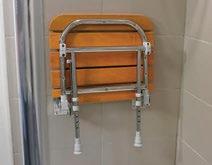


At Premier Care, our extensive range of stylish easy-access showers and walk-in baths have been designed to give people with increasing mobility issues the confidence to bathe safely and securely in style and comfort.
Our all-inclusive service means we take care of everything, from design through to expert installation by one of our skilled teams. We even clean up after ourselves. All you need do is enjoy your new bathroom.
■ A complete service that will transform your bathroom and your life.
■ Peace of mind - helping tens of thousands of people for over 30 years.
For every bathroom installation, Premier Care in Bathing will contribute £100 to Help for Heroes Trading Ltd, which gifts its profits to Help for Heroes, registered charity number 1120920. This campaign was started on 1st November 2014.
For your FREE brochure call us today: 0800 988 4232 Ref P80150F www.premierbathrooms.co.uk
Premier Care in Bathing - the UK’s No. 1 for stylish wet rooms, easy access showers and walk-in baths
Integrated riser grab bar Stylish folding seat
your
& Mrs
“My husband and I would like to thank you for the superb makeover. We are delighted with
service” Mr
R Pleasants
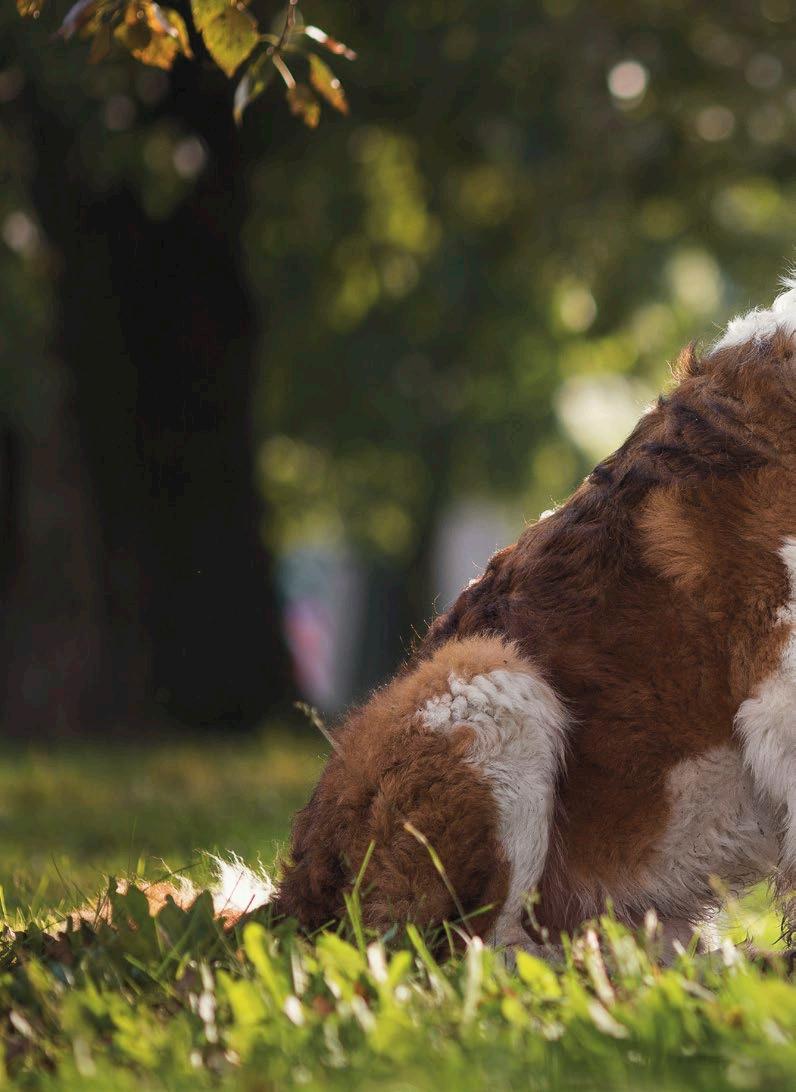
captures the joy and mutual confidence between...
Little Kids & Their Big Dogs
TEXT AND PHOTOS BY ANDY SELIVERSTOFF
Photographer Andy Seliverstoff


103
Matthew talks to his big friend Misha, a Saint Bernard
IN HIS WORK photographing dog shows in Russia and across Europe, Andy Seliverstoff has access to many gorgeous dogs, including rare breeds. He says he’s learned that these dogs “aren’t just beautiful on the outside; they have amazing temperaments, and in particular the large and giant breeds have an innate gentleness that truly belies their stature.”
His interest was sparked when friends asked him to photograph their twoyear-old daughter. “They showed up at the park with their Great Dane in tow,” he says. The St. Petersburg-based photographer was “blown away by the relationship between tiny Alice and gigantic Sean,” he says. He decided to incorporate the dog into the shoot.
Next came a photo session with a little boy named Theodore and Ringo the Newfoundland. “As with Alice and Sean, these photos touched me deeply,” he says. The images captured the special bond between children and dogs. “It’s a connection that doesn’t need words. Love, compassion, joy, trust, honesty and acceptance, to name a few, infuse the relationship. You can see it in their gestures, in their faces.” Posting the photos on Facebook, he found many agreed.
In his 2017 book, Little Kids and Their Big Dogs, from which the photos shown here are taken, Seliverstoff aimed to capture and transmit the state of endless joy and mutual confidence between the children and the animals. The one big message, he says, is this: “Love for dogs and children makes people kinder.”

104
LITTLE KIDS & THEIR BIG DOGS | 01•2018
 Alexandra finds a willing model in her Great Dane, Zarmina
Alexandra finds a willing model in her Great Dane, Zarmina

This page: Jay the Ridgeback dances at Dasha’s command.
Opposite, clockwise from top left: Alice with Sean, her Great Dane; Arthur and his friend Zeus, a Komondor; Theodore with Ringo, a Newfoundland.
Little Kids and Their Big Dogs is available from amazon.co.uk



107 FROM LITTLE KIDS AND THEIR BIG DOGS , COPYRIGHT © 2017 BY ANDY SELIVERSTOFF, PUBLISHED BY REVODANA PUBLISHING, SEA CLIFF, N.Y. REVODANAPUBLISHING.COM
Money Well Spent
The value of taking financial advice always outweighs the cost of doing nothing. Find out how you can secure a sustainable future with Flying Colours

Unlike sunsets, smiles, and the whiskers on kittens, financial advice is not one of the best free things that life has to offer. Many major banks and financial institutions are keen to dispense free financial advice, and sometimes customers who receive it will reap tangible benefits.
But, often such advice can take a “onesize-fits-all” approach that is not tailored to the specific needs of the individual. Inevitably, such advice will sometimes steer the customer towards a financial product—conveniently offered by the financial institution in question—that is not necessarily suitable for their requirements.
So, the key thing to consider is: what is the potential cost of receiving the wrong advice? The long-term impact of any poor financial decision is likely to far outweigh any short-term savings. And, of course, the
decision to go solo and ignore any advice is likely to be the most detrimental of all.
In a recent survey, the International Longevity Centre UK found that people who receive financial advice are, on average, £40,000 better off than those who don’t. The survey also showed that nine out of ten people felt they were satisfied with the advice they received, and the majority will decide to go with their adviser’s recommendation.
Make sure the advice you’re getting is from a reliable source
Engaging with a professional financial adviser can result in significant rewards, the real value of which is likely to become clear over time. According to unbiased.co.uk, for example, a 35-year-old who spends £580 on a consultation with a professional
PARTNERSHIP PROMOTION


People who receive financial advice are, on average, £40,000 better off than those who don’t
pensions adviser will see an extra £25,730 in their pension pot when they come to retire—a 4,336% return on what they initially spent on financial advice.
A good financial adviser will listen carefully to your needs and put together a personalised package that protects your best interests. Crucially, they will assist you with navigating the sometimes choppy waters of investing and saving, helping you to minimise risk in order to make the most of your money.
It’s often said that financially successful people make their money work for them; more often than not, they’ll also have a professional financial adviser in their corner to guide them. n
FOR MORE INFORMATION
• Reader’s Digest have partnered with trusted pension and investment experts Flying Colours to provide you with the guidance you need. We’ll help identify which option is best for you, and aid you to plan successfully for retirement or make the best choices once you get there.
• Our website readersdigestpensions. co.uk clears up the confusion and helps guide you to the most appropriate path for your situation, leaving you with a clear mind and a secure future.
• Our pension experts are available to talk to on 0333 241 9919. We’ll only ever recommend the best pension investment approach to suit your circumstances at the best possible cost and we offer a no cost, no obligation exploratory meeting at a venue convenient to you, which could include your own home.
12 Money Resolutions For 2018
BY ANDY WEBB

Andy Webb is a personal finance journalist and runs the awardwinning money blog Be Clever With Your Cash
A BIG PROBLEM WITH NEW YEAR’S RESOLUTIONS is commitment. You start with the best intentions, but within a few weeks or months life has moved on and the motivation is gone. Sound familiar?
Money always features in these plans—but rather than trying to make one big change to your finances for the whole year, I think it’s easier to pick 12 different tasks and spread them out over the whole of 2018.
But where to start? Well, I’ve got a few suggestions to get your money in shape during the coming year. You might not fancy all of these, or you might have a few alternative ideas you’d like to implement instead. And, of course, you might want to tackle them in a different order. That’s fine. The important thing to remember is that the better you manage your money this year, the more freedom you’ll have.
January The best thing you can do all year is overhaul— or even start—your household budget, so do this before anything else.
Even if you think you run a tight ship, talking half an hour to look through your bank statements can be a revelation. Spend half an hour entering the figures into a spreadsheet or an online budgeting tool and you’ll be able to see just how much you spend over the weeks, months and year on every part of life, from supermarket shopping to one-off annual
MONEY
| 01•2018 110
expenses. It’s bound to be more than you think.
February If you’re not yet retired or claiming your pensions, now is the time to get a pension statement and track down any different workplace funds.
A forecast to show what you’ll get when you do stop working could offer some peace of mind, or be the kick you need to take some action and save more. It’s also worth considering if you want to lower the risk level of your investments to lock in what you have.
March It’s worth checking the interest rate you’re getting on any money you’ve stored in savings. If you had a fixed rate and its time is up, the rate will likely have dropped, whereas if it’s variable,

there’s a high chance you’ll be earning peanuts.
If it’s held in an ISA, you can look to transfer the money to a different ISA. If you haven’t used up your £20,000 allowance for the 2017/18 financial year, you still have time to take advantage of better rates elsewhere.
April If you or your partner aren’t working or have a very low income, and you’re a basic-rate taxpayer, then you can claim the marriage allowance. Do it now and you can backdate your claim to April 2015, which is worth up to £632. Then you’ll be able to claim for the 2018/19 year too.
May I’m pretty confident most of you reading this will still be with your first bank. And that means you’ve been loyal for decades, yet are unlikely to have got much in return.
If you’re willing to switch to a new bank or building society, you can benefit from money back on household bills or up to five per cent interest. You can even claim free money with some banks offering up to £150 as an incentive to move your business to them.
Just look for the Current Account Switch Guarantee and all your money will be moved within seven days and, crucially, future payments to your old account will be moved across too.
June Auditing your insurance might not sound like the best thing to do on a long summer’s day, but it could save you hundreds of pounds. Grab a cold drink as well as your home, car, travel and any other insurance documents and head out into the garden.
You’re looking for one thing in particular on all these policies: when do they end? Make a note of each date in your diary, as well as a month before so you don’t forget. Then, when each one comes up for renewal, start to shop around for a better deal. If you let them auto-renew you’re likely to pay a premium. Again, loyalty isn’t rewarded here.


July If you’re over 60, take advantage of the discounts, freebies and other boosts you’re entitled to. From cheaper cinema tickets to free prescriptions, make sure you’re not missing out.
A ugust There’s never really any good time to talk about getting old and death, so don’t put it off any further. Whether it’s discussing your funeral plans with your children, or finding out about what your parents wish in terms of long-term care, doing it now means there will be less stress—and no surprise costs—at emotionally difficult times.
It’s also worth setting up a lasting
| 01•2018 112 MONEY

power of attorney in case illness stops you dealing with your own affairs.
September While we’re on the topic of death, take the time to write or rewrite your will. It’s your chance to ensure your money goes where you want it to. And if you already have one, make sure it reflects changes to
your life such as the arrival of grandchildren or new relationships.
October Winter is coming, so don’t leave it until you put the heating on to realise you’re paying more than you need for your energy bills. Once again, loyalty rarely pays for your gas and electricity, so go online and compare your options. This takes ten minutes to do and, with a few clicks, your billing can be moved to a cheaper alternative, saving an average of £300 a year.
If you have time, do the same with your phone and TV bills.
November With Christmas on the horizon and the big Black Friday sales dominating the month, it’s a good time to make sure you’re getting the best deals on your shopping. My top tip is to sign up for cashback sites, where you get paid a reward every time you shop.

December If you do have money worries, don’t ignore them. Get help with money problems, such as seeking debt advice, or consolidating any credit card borrowing on a zero per cent balance transfer card.
If you’ve been savvy this year, you should be in a strong place financially, allowing you to enjoy the festivities.
01•2018 | | 113 FOR MORE, GO TO READERSDIGEST.CO.UK/MONEY
READER’S DIGEST
Easy-to-prepare meals and accompanying drinks
Braised Lentils With Sausages
BY RACHEL WALKER

Rachel Walker is a food writer for numerous national publications. Visit rachel-walker.co.uk for more details
THIS IS PROPER HOME COOKING. It’s cheap, it’s hearty and it feeds a crowd. It’s possible to braise the sausages by putting them in with the lardons to make a one-pot dish—but cooking them separately encourages good colour and a lovely crispiness.
Serves 6
• 12 sausages
• 100g lardons or diced pancetta
• 1tbsp olive oil
• 2 onions, diced
• 4 carrots, diced
• 2 celery sticks, sliced finely
• 2 garlic cloves, crushed
• 300g puy lentils or lentils vertes
• 1 sprig rosemary
• 800ml vegetable stock
• 1tbsp Dijon mustard
• ½ lemon, squeezed
• 100g kale
To garnish: flat-leaf parsley (optional)
1. Preheat the oven to 200C, for cooking the sausages later.
2. Tip the lardons into a saucepan or casserole dish, and start to cook on a medium-high heat. When the fat begins to melt, add the additional tablespoon of olive oil, followed by the onions, carrots and celery. Cook for 5–7 minutes, until the vegetables start to soften. Add the garlic to the pan, and cook for 1–2 minutes, until fragrant but not browned.
FOOD & DRINK | 01•2018 114
 BY TIM & ZOË HILL
BY TIM & ZOË HILL
3. Stir the puy lentils through the vegetables, and add the sprig of rosemary to the pan. Cover with stock, bring to a rolling simmer, then drop the heat—so the water is just bubbling—and cook uncovered for 30 minutes.
4. Meanwhile, put the sausages on a lined baking tray, and cook according to pack instructions (usually 15 minutes).
5. If the lentils start to dry out during cooking,

TIP…
If there are vegetarians amongst the group you’re feeding, leave the lardons out of the recipe and switch the sausage to a poached egg.
add a splash of water. Don’t stir them too much during cooking— they shouldn’t be mushy, but tender with a bit of bite to them. Taste, and season with salt, pepper, a tablespoon of Dijon mustard and some lemon juice. Just before serving, add the kale to the lentils and stir gently.
Divide the lentils between six shallow, heated bowls. Place the sausages on top, garnish with parsley and serve with lashings of mustard.
PHOTOGRAPHY
01•2018 | | 115
Robust Tipples
IT’S NOT THE TIME OF YEAR FOR SUBTLETY.


Delicate dishes don’t work with winter colds; the same applies to drinks pairings. Something elegant and chilled might feel right on long summer evenings, but this time of year calls for big, Bavarian beers or spiced Syrah from the southwest of France. These robust European bottles rarely classify as “easy drinking”, but pair them with food, and you’ll reap the benefits of going slightly off-grid.
Ocado has recently started stocking Meantime’s Wheat Beer, which is brewed with Bavarian yeast, giving it a chewy, Germanic quality with a hint of spiciness. Portobello London Pilsner is another home-grown
example of a great, Bohemian beer. It’s hoppy, bitter and best chilled.
Sainsbury’s Languedoc Red represents great value. It’s a jammy and dark fruity blend, which stands up well to big flavours, such as braised lentils and sausages.
Across the border, German Pinot Noir—known as Spätburgunder—is having a moment. Try the Weingut Braunewellat Lea & Sandeman for a really lively bottle with a lot of clout, which goes some way to explain why it’s becoming more and more popular.
FULL-FLAVOURED AND WINTRY
■ Meantime Wheat Beer, £1.90/330ml (5%), Ocado
■ Portobello London Pilsner, £1.77/330ml (4.6%), Morrisons
■ Sainsbury’s Languedoc Red, Taste the Difference, £7/75cl (13.5%), Sainsbury’s
■ Spätburgunder 2015, Weingut Braunewell, £14.95/75cl (12%), Lea & Sandeman




FOOD AND DRINK
| 01•2018 116 © SHUTTERSTOCK
Dried Apricot And Date Flapjacks
Serves 6
• 200g dried and stoned dates
• 100g dried apricots
• 6tbsp boiling water
• 3tbsp lemon juice
• 100g butter, cubed
Pudding of the Month

• 50g self-raising flour, sifted
• 50g white flour, sifted
• 100g porridge oats
• 50g soft brown sugar
1. Preheat the oven to 180C.
2. Finely chop the dates and apricot. Cover them with kettle water and lemon juice. Set them to one side for 20 minutes, so they plump up.
3. In the meantime, line a baking tin with greaseproof paper, leaving overhanging edges.
4. Use your fingertips to rub together the flour, butter, oats and sugar until it looks like a crumble topping. Press half into the baking tin, and then spread the apricot and date mixture on top. Gently press the remaining crumble on top and bake for 25 minutes.
5. Use the overhanging greaseproof paper to lift the flapjack out of the tin, and cut it into rectangles.
BOOK
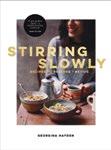
Stirring Slowly, £20, Square Peg. One of the most-thumbed books on my bookshelf, this is full of homely recipes.
BARGAIN
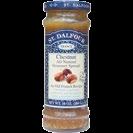
St. Dalfour Chestnut Spread, £1.99/284g, Ocado. Tastes like caramel, but healthier!
BLOW OUT

Selection of raw honey, £32, thelondonhoney company.co.uk. Pure, raw and perfect on porridge.
READER’S DIGEST 01•2018 | | 117
FOR MORE, GO TO READERSDIGEST.CO.UK/FOOD-DRINK
© SHUTTERSTOCK
BY CASSIE PRYCE

Homes and gardens writer and stylist Cassie specialises in interior trends and new season shopping
Silver Luxury
START YOUR
YEAR as you mean to go on! Celebrate in style by adding a little glitz and glamour to your dining-room scheme with these sparkling but elegant silver touches.


1
This tasteful fivearm candle holder will complete your tabletop styling, £20 (jdwilliams.co.uk)


3
Set a cosy scene by lighting a candle in this single pillar lantern, £42 (next.co.uk)

4
2
comfort and style with the Venus champagne crushed velvet chair, £129 (housingunits. co.uk)
Add a bit of drama to any room with the Khloe easy-fit light, £60 (Debenhams.com)
| 01•2018 118 HOME & GARDEN

A Fresh Start
Get ahead of the game and use these winter months to plan for the coming year in your garden

Start by arranging your seeds in this seed packets organiser tin (£19.95, annabeljames.co.uk). Some springflowering blooms need a long period of growth, so start to sow begonias and geraniums early in the year in a propagator or indoors. The Verdi wooden potting table (£99, cuckooland.com) can be kept in a greenhouse to use as a workbench. Herbs such as coriander and basil can be planted indoors and kept on the windowsill. Try the Sophie Conran for Burgon & Ball herb garden seed collection (£10.99, dobbies.com).


01•2018 | 119 FOR MORE, GO TO READERSDIGEST.CO.UK/HOME-GARDEN
From reusing tablets to voice-activated security, this month’s tech offering is all about expediency
Hey Presto
BY OLLY MANN

Olly is a technology expert, radio presenter and podcaster

HUAWEI MATE 10 PRO, £699 Now that Samsung, Sony and Apple’s top handsets are pushing £1,000 a pop, those seeking the latest spec should explore more affordable Chinese offerings. The Mate Pro looks uninspiring in standby mode, but when the Mobile HDRready, OLED screen leaps into life, it truly dazzles. The Leica dual lens, though grainy in low light, takes gobsmackingly good pictures in daylight—the best unfiltered mobile shots I’ve seen. Just as speedy and secure as its pricier rivals, it’s a great phone choice—so long as you don’t require a 3.5mm headphone jack.

APPLE APP OF THE MONTH: DUET FOR IPAD, £14.99 Here’s a clever way to utilise your old tablet—rig it up to your Mac or Windows PC as an additional monitor. This app, created by ex-Apple

engineers, is as straightforward to set up as official software—simply plug in any old iPad (running iOS 8 or later) using your original charging cable and hey presto, you’ve doubled the real estate on your laptop screen. You’re welcome.
TECHNOLOGY | 01•2018
120
AMAZON ECHO SHOW, £199
The judges at the T3 Awards recently decreed Amazon Echo their “Gadget of the Year”, and it’s hard to disagree. You may not actually want a home speaker eavesdropping on everything you’re saying just to provide you with voice-activated convenience, but I can’t recall a gadget since the iPad that’s so rapidly introduced millions of people to a whole new product category. Echo Show chucks a touchscreen and webcam into the mix—so, for example, you can ask it to video-call your mum, display your calendar, or show your security cameras.
MISFIT PHASE, £135

I’ve resisted buying a smartwatch. I admire the old-fashioned craft of an tick-tocking analogue face and a masculine leather strap. I see the benefit of reading text messages on my wrist, but frankly I never warmed to digital watches in the 1980s, so I’m hardly going to go gaga over brightly backlit web-connected watches now. The closest I’ve come to biting the bullet, however, is the Misfit Phase: it hides its connectivity under a traditional face, vibrates when you receive an SMS, and doesn’t require charging (you just replace the battery every six months). Subtle.


ANDROID APP OF THE MONTH:
LOOPIMAL, £2.49 This charming app is intended to teach kids about musical arrangements, but I’ve found it a pretty pleasurable way to relax as well! A sequence of crudely animated animals (they could be Peppa Pig’s extended family) jig about to looped sounds that you dump down in an interactive sequence of shapes, each of which represents a different rhythm or accompaniment. Melodic and strangely satisfying.

01•2018 |
121
BY GEORGINA YATES

Georgina is a fashion and beauty editor for numerous travel titles and a blogger at withgeorgia.com
New Year, New You
FOLLOWING WEEKS OF FESTIVE CELEBRATIONS and cold weather, your skin is bound to feel and look a little tired. Smart beauty gadget Foreo Luna 2 (£169, feelunique.com) is designed to shift dirt and dead skin cells, stimulate elastin (which helps to plump out wrinkles) and activate circulation.
The textured, medical-grade silicone brush emits high and low frequency pulsations, gently buffing the skin. Along with its 12 adjustable intensities, the cleansing device has also special silicone brush heads for sensitive, normal, combination and oily complexions.
Best of all? It only takes a couple of minutes to use. Simply apply your favourite cleanser, wet the brush head, then glide it over your face in circular motion—and watch as all your festive sins are buffed away (from your skin, at least)!

PLUMP UP THE VOLUME
■ Give your lips an extra lift with Soap and Glory’s Sexy Mother Pucker (£10, boots. com) lip shine. Designed for use on bare lips or over lipstick, its subtle tingling sensation activates lips, making them feel and look plumper.

ROSY CHEEKED
■ With the elements wreaking havoc on your skin, treat it to the indulgent Damask Rose Facial Oil (£29, greenpeople.co.uk) from Green People. It restores skin’s suppleness—and its aroma is good for your soul.

| 01•2018 122
FASHION & BEAUTY

■ Simple and chic, this moss-green velvet dress oozes elegance (£245, toast.co.uk).
VELVET TOUCH For Her For Him

■ Dine in style with this black velvet dinner jacket (£220, houseoffraser.co.uk).
■ A velvet tunic can be paired with leggings or tights for a smart-casual look (£199, east.com).

■ You could say he wore blue velvet...(£99, marksandspencer.com).


■ Nothing defines winter glamour like a black and silver velvet jumpsuit (£68, next.com).

■ Splash out on a statement crimson velvet jacket from smart British label Simon Carter (£395, simoncarter.net).
01•2018 | | 123
Chilling psychological thrillers in the vein of The Girl on the Train, destined for great success
January Fiction
BY JAMES WALTON

James writes and presents the BBC Radio
4 literary quiz The Write Stuff
IT’S NOW AN OFFICIAL READER’S DIGEST TRADITION that the January fiction column acknowledges January’s status as Psychological Thriller Month. Ever since The Girl on the Train hit the jackpot in January 2015, every new books year has begun with Britain’s biggest publishers excitedly bringing us the debut thrillers that they think have the best chance of doing the same. All three here duly come accompanied by news about all the countries they’ve been sold in, the major motion pictures they’re set to become and the big-name authors who think they’re amazing. But do they live up the hype?
For A J Finn’s The Woman in the Window (HarperCollins, £12.99), the answer is a triumphant yes. The book is billed as “Hitchcock’s Rear Window meets The Girl on the Train”—and, while a novel this rich really shouldn’t be reduced to a sound bite, you can see why. The narrator Anna spends much of her time drunk in her New York house, where she’s suffering from acute agoraphobia. She also spies on her neighbours with a zoom lens—and one night witnesses a murder. Unfortunately, given her boozing, mental illness and the fact that the victim appears to still be alive, nobody believes her. But then…well, there’s a series of terrific twists that manage the rare double of being both completely startling and the only logical explanation of what we’ve been reading.
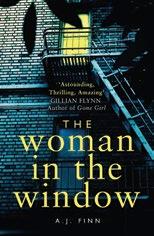
BOOKS | 01•2018 124
Add to that Anna’s beguiling narrative voice—by turns wisecracking and heartbreaking, defeated and defiant—and the result is not just one of the best thrillers I’ve read for ages; it’s one of the best books of any kind.
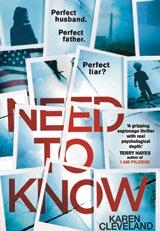
Annoyingly for hypehaters, Need to Know (Bantam, £12.99) is pretty great too.
Karen Cleveland—a former CIA analyst— has had the neat idea of combining the oldschool paranoia of the spy story with the more modern paranoia of the domestic thriller. The main character is Viv Miller, who also works for the CIA, where her job is to hack into the computers of Russian spymasters looking for photographs of “deep-cover operatives” in America. Her exhilaration at finding them, however, is somewhat tempered when one photo turns out to be of her beloved husband Matt.
When she confronts him, Matt admits that he is indeed a Russian spy who was sent to America to marry a CIA agent. But now, he swears, his love for her and their four children is genuine. So can the couple find a way of covering up her findings without going to prison? Above all, can she trust him? For most readers, I suspect, the answers
to these questions will vary every few pages of this gripping novel— although, in my experience, whatever you’re thinking at any point is likely to be wrong.
Finally, C J Tudor’s The Chalk Man (Michael Joseph, £12.99) returns us to more familiar psychologicalthriller territory, with a short, grisly prologue followed by alternating chapters from different eras, gradually revealing how the grisliness happened.

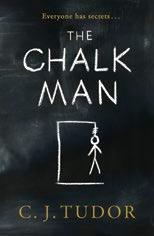
The narrator is Eddie: in 1986, a slightly odd schoolboy in a small English town; in 2016, a slightly odder teacher in the same place. Tudor does a fine job of showing how haunted Eddie is. She also creates a winningly dark atmosphere and serves up a beautifully timed stream of intriguing new plot elements.
The trouble comes when she has to tie them all together. Anybody who starts The Chalk Man will surely power to the end with mounting excitement. Having reached it, though, they may find its mixture of loose ends, implausibility and melodrama a bit of a let-down.
01•2018 | 125
THRILLERPSYCHOLOGICAL MONTH
With great gusto and even better anecdotes, Roger Hutchinson reveals the fascinating history behind the national census RD’S RECOMMENDED READ
Counting The Population
STRANGE BUT TRUE: one of the most important opinion pieces in the history of the British press was published in the June 1800 issue of The Commercial, Agricultural and Manufacturers Magazine. At the time, there was much anguished debate about the size of Britain’s population. Many experts were convinced it was in disastrous decline, others that it was increasing far too quickly. The biggest question of all, though, was what the population actually was, with estimates/wild guesses ranging from 4 to 6 million. But then John Rickman, the magazine’s editor, came up with a radical suggestion: why not count it?

for a ten-yearly census that began in 1801 and has continued ever since. For the record, the population of the UK was initially found to be a healthy 15 million, and after that to be growing nicely.
Rickman’s idea became the basis

The Butcher The Baker The Candlestick Maker; The Story of Britain Through Its Census, Since 1801 by Roger Hutchinson is published in paperback by Abacus at £12.99.
In this enthralling book, Roger Hutchinson (above) explains how the counting was done. But he’s had the inspired notion, too, of using these ten-yearly snapshots to tell the story of Britain—identifying the precise timing of the most profound social changes (between 1821 and 1831, the expansion of Britain’s cities was “breathtaking”) and lots of the
©
GILLANDERS BOOKS
ROBIN
| 01•2018 126
more minor ones (between 1851 and 1861, for example, the number of professional photographers increased nearly sixtyfold).
On the whole, Hutchinson shares the optimism of the early censustakers. But some of his material, naturally, makes cheerfulness impossible. In the first census after the First World War, the decline in the number of young men since 1911 was as unmistakable as the rise in the number of widows.
Here are a couple of typical passages: one about the census of 1911; the other an example of Hutchinson’s willingness to throw in interesting things more or less for their own sake…
Slavery, which had been so commonly recorded seven centuries earlier in the Domesday Book, was effectively outlawed in Great Britain by the end of the 18th century. Early in the 20th century, however, the rank of slave made a comeback. In 1911 Mrs Alice Maude Mary Ayers of London registered herself as a ‘White Slave’. Born in Battersea 46 years earlier, she was the wife of a photographer’s assistant and auxiliary postman named Ben Ayers. Alice and Ben had three adult children and lived in a five-bedroomed house in Chelsea.
Alice Ayers was not alone. In the same census, 48-year-old Mrs Elizabeth Bond of Cambridge listed
CENSUS WORKING OVERTIME: MORE FINDINGS FROM THE BOOK
■ The 1851 census discovered that one person in 979 was blind—a fact that was attributed to the proliferation of smallpox. (Vaccination was made compulsory two years later.)
■ In that same census, Charlotte Brontë—who had published Jane Eyre four years previously—described her profession as “none”.
■ In 1861, the population of the City of London—by then the undisputed financial centre of the world—included 44 farmers and one shepherd.
■ Mary Thomas, from Denbighshire, Wales had the most children ever recorded for a British woman, with 33. She died in 1899, aged 85.
■ The 1931 census was the first to include “out of work” as an occupational category.
■ In 2001, 390,127 people described their religion as “Jedi”—making it the fourth largest faith in the country.
READER’S DIGEST
‘‘
01•2018 | 127
her ‘Profession or Occupation’ as ‘Domestic Slave’, while 52-year-old widow Lucy Gilbert of Bermondsey, who had her adult son, three grownup daughters and three boarders under her roof, described herself simply as a ‘Slave’.
Centenarians attracted enduring attention, and occasionally offered a form of time travel
A couple of hundred variations on the same theme could be found throughout Great Britain. Those women, and in some cases their sympathetic husbands, were suffragettes, engaging in the first concerted attempt to use the census as a means of protest. Having begun in earnest in the second half of the 19th century, by 1911 the women’s suffrage movement was approaching the height of its formidable activities. It engaged in a wide variety of both violent and non-violent campaigns, of which subverting the national census was among the most imaginative…”
“The longest-living person to be enumerated in the national census was 37 when the First World War broke out in 1914. Charlotte Hughes, who attributed her longevity to ‘a good honest life and adherence to the Ten Commandments’, celebrated her 108th birthday in 1985 at 10 Downing Street, where she told prime minister
Margaret Thatcher, ‘Don’t cuddle me, I’m Labour.’ She marked her 110th birthday by flying to New York on Concorde. She died in 1993 at the age of 115 years and 228 days; she was then the second oldest person in the world, and the oldest Briton of either gender ever to be recorded.
Centenarians, and to a lesser extent nonagenarians, attracted enduring attention, and occasionally offered a form of time travel. Maurice Bowra, the warden of Oxford University’s Wadham College between 1938 and 1970, wrote in his 1966 memoirs of older members of Wadham whom he had met in the early 1920s. ‘The most astonishing was Frederick Harrison,’ recalled Bowra. ‘He was 92, and had vivid memories of Paris after the fall of Louis Philippe in 1848. He remembered the accession of Queen Victoria when he was seven years old…Incidentally he provided a link with a still remoter past by a neat chain of circumstances. He had as an undergraduate met [Martin] Routh, President of Magdalen [College], who died in his hundredth year soon afterwards. Routh had in his boyhood met an old lady, who had in her girlhood seen Charles II exercising his spaniels in Magdalen Grove.’
BOOKS
’’
| 01•2018 128
Books
THAT CHANGED MY LIFE
Dame Vera Lynn became known as “the Forces’ Sweetheart” for her morale-boosting visits to sing to the allied troops. Her new book, Keep Smiling Through, is out now.
Murder on the Orient Express
BY AGATHA CHRISTIE

It’s rather astonishing to think that I read this marvellous novel when it was first published in 1934. Christie was a master of her craft and she introduced me to the detective genre, which I’ve enjoyed ever since. I was swept away by the glamour of travel on the Orient Express and couldn’t help but think how wonderful it would be to visit farflung places. During the war, I went to sing to our troops in Egypt and India and spent four months in Burma. There weren’t any luxuries there— you just had make the best of what you were given.
The Wind in the Willows
BY KENNETH GRAHAME
I used to read this to my daughter Ginny when she was about five years old. The war was over by then, the


country was rebuilding itself and my husband Harry and I were enjoying living the quiet life. I’d sit with Ginny in our little regency sitting room at the front of our house in Finchley and we’d lose ourselves in the peace and tranquillity of Grahame’s Thames Valley countryside.
The Silent World of Nicholas Quinn
BY COLIN DEXTER
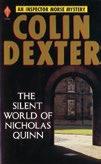
Colin Dexter left a great legacy of books, which I’m very grateful for. Inspector Morse’s irreverence makes me chuckle, but it’s the plots that really intrigue me. Detective novels force you to think hard; puzzling things out is something I really enjoy. It’s a bit like doing my knitting—if I go wrong I have to work backwards to figure out what happened! Luckily my eyesight is extremely good and, even though I’m soon to be 101 years old, I still read prolifically. As told to Caroline Hutton
01•2018 | 129
FOR MORE, GO TO READERSDIGEST.CO.UK/BOOKS JIM HOLDEN/ALAMY STOCK PHOTO
You Couldn’t Make It Up
Win £50 for your true, funny stories! Go to readersdigest. co.uk/contact-us or facebook.com/readersdigestuk
I WAS AT THE OPTICIANS when an anxious elderly man stated his frustration that his third pair of glasses needed repairing.
When I asked why the necessity for three pairs, he replied, “One for short sight, another for long sight, and the third pair of glasses is to search for the other two!”
JILL COHEN, Yorkshire
MY MUM WAS WEARING a new outfit for a dinner date she was about to go on. She looked lovely, and just before she left she handed me her phone and asked, “Will you take a selfie of me?”
 LAUREX HEX, Denbighshire
LAUREX HEX, Denbighshire
OUR SON LEFT a pair of his dirty trainers on the kitchen table and his dad complained, “Surely he’s got more sense? We eat off that table. It’s absolutely disgusting.”
Later that evening, I came home with my shopping and there was my husband, renovating his gear box on the middle of the kitchen table!
STEPHANIE BRYN, Merseyside
RECENTLY MY HUSBAND and I went to my five-year-old son’s teacherparents’ meeting and were pleased with his progress. His teacher handed us his journal and we read about his personal experiences.
My husband’s face changed when he read what my son had written. “I heard the door ring and I went to answer it. It was Dad. He went in and ate all my McDonald’s. He ate the nuggets, fries and burgers, then the
CARTOON:
| 01•2018 130 FUN & GAMES
JAMES GRIFFITHS
apple pie and drank all the CocaCola. He just ate it all. There was nothing left!”
CHRISTINE MANEJERO, Stockton-on-Tees
MY VEGETARIAN TEENAGE niece came to stay with us from Belgium. One day she was surprised when something she ordered came with bacon. The waitress reminded her she’d ordered a BLT.
It turned out that she thought the “B” stood for bread!
KAYLA MADDOCKS, Hertfordshire
WHILE VISITING a chocolate factory in Wales, I spotted a sign on the wall that read, “Seven days without chocolate makes one weak.”
JENNIE GARDNER, Bath
ALTHOUGH MY DAUGHTER loved her first Advent calendar, she lost interest in it after a few days.
All became clear when I realised she’d already opened all the doors to eat the chocolate inside and closed them up again.
MICHA BRYN, Liverpool
A FRIEND OF MINE, not renowned as a good cook, bought a prepared pack of beef and chopped veg and had proceeded to fry it in her wok when bubbles appeared.
She was baffled until she realised that her oil bottle happened to be standing next to the washing up liquid. JAN CUNNINGHAM, by email
MY DAD HARDLY EVER treats himself, so when Christmas arrived I gave him £100 and told him to go out and buy something that would make his life easier. He came home with a present for my mum!
MAXINE COOPER, Clapton
I OVERHEARD A PARENT reprimanding their child by saying, “Stop pulling that cat’s tail.”
“I’m only holding it,” came the reply. “The cat is pulling.”
GWILI LEWIS, Cheshire
I HAD TO SMILE when my neighbour Rose told me that she was constantly getting invited round to her daughter’s house, but wasn’t always keen to go.
“Sometimes I tell them that I’ve got a splitting headache,” she told me. “But that’s not really helpful because her husband is a doctor and he always comes round to make sure I’m OK!”
KIMBERLEY YESSEN, Cambridgeshire
OUR LITTLE GIRL, EVE, could often be uncooperative. My husband used to tease her with an imaginary good girl called Mary.
If she was naughty, he’d say, “Mary would never do that.” One day, he asked Eve to come to the shops. She refused as usual.
“But I’ll be lonely,” he pointed out.
“Take Mary, then,” came the reply.
JUNE STRINGER, Derbyshire
READER’S DIGEST 01•2018 | 131
Simple-To-Use SMARTPHONES

Doro, the world leader in easy-to-use mobile phones, is working hard to make smartphone technology accessible to all— regardless of age or ability.
The Doro Liberto® 820 Mini is an unquestionably powerful smartphone, with high functionality rivalling the many competitors on the market. The simple and highly visual instructions—coupled with large icons and loud, clear sound—enables smartphone beginners to do more, faster.












Buy a new Doro Liberto® 820 Mini smartphone today, for the special price of £150, which includes an Anywhere SIM card connection and £40 of credit, allowing you to roam the UK with signal from O2, EE, Three and Vodafone.
Simply go to readersdigest.co.uk/ mobilephones or call 03454 133 953 and quote “Reader’s Digest o er”.
PARTNERSHIP PROMOTION
SPECIAL Reader’s Digest OFFER!
Word Power
We bring you some zippy words starting with the last letter of the alphabet. Proceed with zeal and zest, and when you need to check your answers, zoom over to the next page.
BY EMILY COX & HENRY RATHVON
1. zabaglione n —A: canvas sack. B: stage villain. C: whipped dessert served in a glass.
2. zaftig adj —A: charmingly witty. B: pleasingly plump. C: famished.
3. zax n —A: roofing tool. B: music synthesiser. C: caffeine pill.
4. zephyr n —A: ancient lute. B: gentle breeze. C: crown prince.
5. zeta n —A: prototype. B: sixth letter of the Greek alphabet . C: exceptional beauty.
6. zetetic adj —A: arid. B: investigative. C: made of hemp.
7. ziggurat n —A: lightning bolt. B: pyramidal tower. C: flying squirrel.
8. zinfandel n —A: narrow valley. B: heretic. C: red wine.
9. zircon n —A: gas-powered blimp. B: gemstone. C: oversized traffic cone.
10. zloty n —A: airhead. B: Polish currency. C: earphone jack.
11. zoetrope n —A: optical spinning toy. B: sun-loving flower. C: exaggeration.
12. zori n —A: antelope. B: flat sandal. C: seaweed wrap.
13. zydeco n —A: music of southern Louisiana. B: magnifying glass. C: secret password.
14. zygomatic adj —A: related to the cheekbone. B: mysterious. C: of pond life.
15. zyzzyva n —A: type of weevil. B: uncomfortable or tricky situation. C: fertilised cell.
IT PAYS TO INCREASE YOUR
01•2018 | 133
Answers
1. zabaglione—[C] whipped dessert served in a glass. “I hate to waste a good zabaglione, but I’m on a diet.”
2. zaftig—[B] pleasingly plump. “The character in that film was a bit zaftig, thanks to her chocolate habit.”
3. zax—[A] roofing tool. “Kamal built this entire cabin himself, from laying every floorboard to trimming every roof tile with a zax.”
4. zephyr—[B] gentle breeze. “On stressful days, I like to fantasise I’m on a tropical beach with a cool zephyr blowing through my hair.”
5. zeta—[B] sixth letter of the Greek alphabet. “The up-and-coming tech firm uses a zeta as its logo.”
6. zetetic —[B] investigative. “ ‘My zetetic methods,’ said Sherlock Holmes, ‘are quite elementary, my dear Watson.’ ”
7. ziggurat—[B] pyramidal tower. “The king ordered his subjects to build a great ziggurat in his honour.”
8. zinfandel—[C] red wine. “ ‘Do you think zinfandel pairs well with nachos?’ Alyssa asked with a smirk.”
9. zircon—[B] gemstone. “She thought he gave her a diamond engagement ring, but those gems were just zircons.”
10. zloty—[B] Polish currency. “How’s the zloty holding up against the euro?”
11. zoetrope—[A] optical spinning toy. “Before there were movies, people could get the illusion of motion from a zoetrope’s whirling images.”
12. zori—[B] flat sandal. “After the strap on her zori snapped, Joelle had to go barefoot for the rest of the day.”
13. zydeco—[A] music of southern Louisiana. “Ian became a big fan of zydeco on his last trip to New Orleans.”
14. zygomatic—[A] related to the cheekbone. “Many US football players use a zygomatic stripe of greasepaint to reduce glare.”
WORD OF THE DAY*
DISTRAIT
Inattentive or preoccupied, especially because of anxiety.
Alternative suggestions:
“The waterway to hell.”
“Question that should have been asked when building the tower at Pisa.”
“Opposite of dicurvy.”
15. zyzzyva [A] type of weevil. “ ‘I can’t believe this—there are zyzzyvas in the organic quinoa I just bought!’ Matthew exclaimed.”
VOCABULARY RATINGS
9 & below: zonked
10–12: in the zone
13–15: at the zenith
WORD POWER | 01•2018 134 *POST YOUR DEFINITIONS EVERY DAY AT FACEBOOK.COM/READERSDIGESTUK
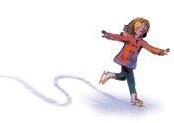









Brainteasers
POTATO BINS
There are 100 potatoes spread over three bins in a greengrocer’s.
A total of 35 potatoes are in bins A and B .
A total of 75 potatoes are in bins B and C .
How many potatoes are in each bin?
Challenge yourself by solving these puzzles and mind stretchers, then check your answers on p139. A B C
BUBBLE MATH
Assign a whole number between one and seven to each of the seven bubbles. Each number occurs once. The sums of some of the numbers are revealed in the areas where their bubbles overlap. Can you figure out which number goes in each bubble?
FUN & GAMES | 01•2018 136
14 7 11 10 6
(BUBBLE MATH) RODERICK KIMBALL; (POTATO BINS) FRASER SIMPSON
COUNTING DIGITS
How many times does the digit 5 appear in the numbers from 1 to 100?
MATCH PLAY
The grid contains matches of different sizes, any of which may be completely unburned, partially burned or completely burned. Matches burn from the head (the red end) to the tail without skipping segments. The numbers outside the grid indicate the number of burned segments in the corresponding row or column. Can you shade in the burned segments to “match” the numbers?
LOST TIME
Sue and Pam made arrangements to meet at a café at 2pm. Sue thinks her watch is 25 minutes fast, although it’s actually ten minutes slow. Pam thinks her watch is ten minutes slow, while it is actually five minutes fast. What will happen if they both aim to arrive exactly on time?
01•2018 | 137 4 5 5 3 2 3 4 3 4 4 5 2 3 5
(COUNTING DIGITS; LOST TIME) MARCEL DANESI; (MATCH PLAY) FRASER SIMPSON
…100
1
DOWN
BRAINTEASERS
Test your general knowledge ACROSS 01 Bivalve mollusc (6) 04 Queen of Castile who married Ferdinand of Aragon (8) 10 2007 thriller starring Reese Witherspoon, Meryl Streep and Jake Gyllenhaal (9) 11 A Fish Called _____, John Cleese film (5) 12 1960s Lotus sports car model (4) 13 Unaccompanied singing (1,8) 16 Someone studying living things (9) 17 Beethoven’s last symphony (5) 18 Pennsylvanian religious sect (5) 20 Detective Inspector played by David Jason (4,5) 23 Singers of “Needles and Pins” (9) 24 Singing brother of Don Everly (4) 27 Unleavened bread round eaten at Passover (9) 28 Internal combustion engine firing device (5,4) 29 Town north of Peterborough (8) 30 Rock forming the Giant’s Causeway (4)
CROSSWISE
01 Dorset village famed for its hillside “giant” (5,5) 02 One hundredth of an escudo (7) 03 First name of Superman’s girlfriend (4) 05 Dark solar surface patch (7) 06 Dagger with a blade double-edged at the point (5,5) 07 Fatty substance from wool (7) 08 Irish islands (4) 09 Korean spicy cabbage dish (6) 14 Timber from which Noah’s Ark was made (6,4) 15 Apparently colourless illumination (5,5) 19 Chilled drink produced by Lipton’s (4,3) 20 Surname of two US presidents, one in the 1860s and one in the 1960s (7) 21 North American enclosure for horses and cattle (6) 22 Daughter of Polonius in Hamlet (7) 25 Old Testament book after Joel (4) 26 Large predatory gull-like bird (4) 6 1 2 5 25 20 7 8 10 18 9 26 15 12 16 29 3 30 23 27 19 14 13 28 4 21 11 17 24 22 | 01•2018 138
BUBBLE MATH
POTATO BINS
25 potatoes in A, 10 potatoes in B and 65 potatoes in C.
COUNTING DIGITS
20 times. The digit 5 appears ten times as a last digit (5, 15, 25...95) and ten times as a first digit (50, 51, 52...59).
MATCH PLAY
LOST TIME
Pam will arrive at 1.45pm, 15 minutes ahead of time. Sue will be 35 minutes late.
The first correct answer we pick on January 3 wins £50!* Email excerpts@ readersdigest.co.uk
ANSWER TO NOVEMBER’S PRIZE QUESTION

A. Each line contains two elephants facing left and one facing right. Each line contains two red balls and a green ball. Each line contains one elephant with a missing tail. The missing image should be of a left-facing elephant with a red ball and no tail.
AND THE £50 GOES TO… Bob Kelley, Surrey
PRIZE QUESTION Answer published in the February issue READER’S DIGEST 01•2018 | 139 ANSWERS :crossA 1 Cockle 4 Isabella 10 Rendition 11 Wanda 12 Elan 13 A cappella 16 Biologist 17 Ninth 18 Amish 20 Jack Frost 23 Searchers 24 Phil 27 Matzo 28 Spark Plug 29 Spalding 30 Basalt :ownD 1 Cerne Abbas 2 Centavo 3 Lois 5 Sun Spot 6 Bowie Knife 7 Lanolin 8 Aran 9 Kimchi 14 Gopher Wood 15 White Light 19 Iced Tea 20 Johnson 21 Corral 22 Ophelia 25 Amos 26 Skua
£50
Brainteasers: Answers 14 7 2 4 7 6 1 3 5 11 10 6
A B C D E is to as is to
Laugh!
Win £50 for every reader’s joke we publish! Go to readersdigest. co.uk/contact-us or facebook.com/readersdigestuk
YOUTH IS WHEN you’re allowed to stay up for New Year’s Eve.
Middle age is when you’re forced to.
AUTHOR BILL VAUGHAN
THERE WAS A STORY in the papers recently about a family who left their three-year-old in a corn maze overnight by accident.
Like all parents, whenever I hear these kinds of things it always gives me…ideas.
SEEN ONLINE
A WHEELY HEFTY FINE
A VULTURE BOARDS a plane carrying two dead raccoons.
The air hostess says, “I’m sorry, Sir, but we only allow one carrion.”
SEEN ON TWITTER
A FARMER’S YOUNG SON was really interested in tractors so, for his third birthday, his father took him to a tractor show. The boy loved it so, for his tenth birthday, his father let him ride with him on his tractor. Again,
...is the amount a driver from Montreal was charged by police after complaints over his continual “screaming”. It soon became clear he was actually singing along—albeit loudly—to “Everybody Dance Now”.
Source: newser.com

FUN & GAMES | 01•2018 140
$118
he loved it. For his 17th birthday, the father bought his son his very own tractor.
The son was having a great time and spent all day riding up and down the fields, until he hit a mound and was stuck for hours in the rain before his dad could rescue him. After that the son absolutely hated tractors.
A few months later, he was walking down the street when he spotted a house on fire and a woman screaming, “My baby! Save my baby!”
The son ran up to the door, breathed in and inhaled all the smoke so the fire went out, ran up, saved the baby and brought it back down to its mother.
ONE HAPPY CAMPER
Azuki is a tiny hedgehog with a big dream: to enjoy the great outdoors (as seen at boredpanda.com).
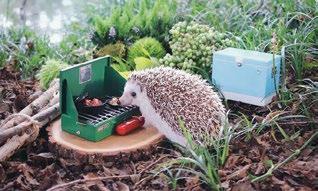
The woman thanked him over and over again and asked how he did it. “Oh, it’s nothing,” the son said. “I’m an ex tractor fan.”
SEEN ONLINE
I WENT TO THE ZOO last week and saw a baguette in a cage.
The zookeeper told me it was bread in captivity.
TRACEY DAVIDSON, Warwickshire
A DRUNK MAN stumbles into a bar and announces to the room, “Happy New Year, everybody.”
Surprised, the waiter replies, “It’s not New Year, it’s June. You must be drunk.”
“Oh my god,” the drunk replied. “My wife is going to kill me. I’ve never been so late in my life!”
SEEN ON FACEBOOK



READER’S DIGEST 01•2018 | 141
ZOONAR
GMBH/ALAMY STOCK PHOTO
A MAN WALKED into a bar and took a seat. Before he could order a beer, the bowl of peanuts in front of him said, “Hey, you’re a handsome fellow.” The man tried to ignore the bowl of peanuts, and ordered his drink. The bowl of peanuts then said, “Ooh, great choice. You’re clearly a smart man.”
Starting to panic, the man said to the bartender, “Hey, what the hell? This bowl of peanuts keeps saying nice things to me!”
The bartender replied, “Please don’t worry, Sir, those peanuts are complimentary.” SEEN ONLINE
IT TOOK ME YEARS, but I’ve finally become comfortable in my body.
Let me tell you, the weight was worth it. SEEN ON TWITTER
BREAKING NEWS from Egypt: they’ve found a tomb covered in nuts and chocolate.
Experts say it was a Pharaoh Rocher. SEEN ONLINE
“JUST POP THAT in the stationery cupboard,” said the office manager, handing his trainee a new roll of bubble wrap.
It took her all morning, but somehow she did it.
TWO ELEPHANTS and a snake fall off a cliff.
Boom, boom, tiss. SEEN ONLINE
A TERMITE WALKED into a pub and asked, “Is the bar tender here?”
SEEN ON FACEBOOK
WHY I QUIT
The people of Twitter share the strangest reason they had to leave a job:
@SoupyMcSoupFace: “My boss refused to correct my name badge, which said ‘Brain’ instead of ‘Brian’. He said, ‘You’re Brain now, so deal with it.’ ”
@Toshoonly: “My boss made me give him piggy-back rides after we mopped the floors every night so there would be fewer footprints.”
@Bren_Nancarrow: “I babysat this kid who kept pointing at me and saying, ‘You’re next.’ After the fourth time I gave my two weeks’ notice.”
@KSchmooze: “My old office had a phone in the toilets. My boss would call if he thought I’d been in there too long.”
LAUGH | 01•2018 142
MAGGIE COBBETT, Ripon
60-Second Stand-Up
We chatted to rock ‘n’ roll Canadian comic, Tom Stade
WHAT’S YOUR FAVOURITE OF YOUR OWN JOKES?
So I went to China. They have a Great Wall there, or they think it’s great. There’s a wall by my place where I can smoke joints and the cops can’t see it from the road. Now that’s a great wall.
WHAT’S THE BEST PART OF YOUR CURRENT TOUR?
The audience interaction that I’ve created. I feel like the audience has a say in where the show goes. I’m a good writer but I was asking myself, Am I a real comedian? Can I make stuff up on the spot? That was the goal for this show, to see if I could do it.
WHAT’S YOUR MOST MEMORABLE HECKLE EXPERIENCE?
I asked a guy’s name at a show in Aberdeen and he got so upset. He said, “I’ve been coming to this show for six years and you don’t even know my name.”
He got up to order a beer and from the stage I said, “You might as well get me one too, No Name.” Everybody was laughing their heads off.
WHAT’S YOUR BEST ONE-LINER?
I like Jesus, but he loves me, so it’s kind of awkward.

WHO INSPIRES YOUR COMEDY?
My family. On stage I’m all of my family put into one. All they used to do was laugh.
IF YOU COULD BE A FLY ON THE WALL, WHOSE WALL WOULD YOU BE ON?
Kim Jung Un. I love a good dictator.
IF YOU COULD HAVE ANY SUPER POWER, WHAT WOULD IT BE?
Probably immortality…
For upcoming appearances and tour dates, visit tomstade.co.uk
READER’S DIGEST 01•2018 | 143
FOR MORE, GO TO READERSDIGEST.CO.UK/LAUGH
Beat the Cartoonist!
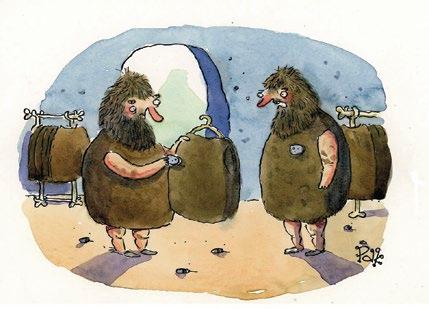
Think of a witty caption for this cartoon—the three best suggestions, along with the cartoonist’s original, will be posted on our website in midJanuary. If your entry gets the most votes, you’ll win £100
Submit to captions@readersdigest.co.uk or online at readersdigest.co.uk/caption by January 12. We’ll announce the winner in our March issue.
November’s Winner

The cartoonist had all the RD staff laughing this month with his darkly humorous caption: “I like the way they come on their own serving trays.” However, it didn’t impress all of our readers, winning just 23 per cent of the votes. Top prize went to Tim Wilbur, who won over 44 per cent of readers with a similarly themed caption: “Mmm surf and turf, my favourite.” Well done, Tim—a victory well deserved!
IN THE FEBRUARY ISSUE

The TV presenter on finding her calling.

• The Couples Who Mix Love and Work
• Travelling Solo in India
• The Essential Health Screening “I
| 01•2018 144
Plus
Remember”: Gloria
Hunniford
Where is Everyone? The universe is vast—can we really be the only ones? CARTOONS: PETER A. KING (TOP) / BRUCE ROBINSON
Rise & Recliner Chairs And Adjustable Beds











By choosing Grosvenor Mobility for your Rise and Recliner Chairs or Adjustable Beds, you are ensuring that you receive first class customer service, complete after sales care and above all, premier mobility furniture of the highest quality. We take immense pride in what we do and all of our Rise and Recliner Chairs and Adjustable Beds come with a five-year parts and labour warranty, providing complete peace of mind. All our products are brought to life by highly experienced craftsmen, using traditional age-old techniques and only the finest materials to give you a beautiful, British made product that is unparalleled.

trade in on your existing furniture £300 DISCOUNT VOUCHER www.GrosvenorMobility.com 0808 271 4557 Call FREE today for a FREE brochure FREE 5 Yr Warranty For Peace of Mind * Sale ends 31st January 2018 *HALF PRICE SALE! MASSIVE 50% OFF ALL PRODUCTS! FREE White Glove Delivery & Installation FAST TRACK Delivery Available FREE Made To Measure Service FREE Home Demonstration Crafted in Britain













At Oak Tree, we think everyone should be free to enjoy a rich and ful lling life. With our top-quality adjustable chairs and beds, we have already helped thousands to do exactly that.

* Half price o er valid on all second items. Half price item must be of the same value or less than your chosen item and must be ordered at the same time. O er ends 28th February 2018.
** Trade-in o er cannot be used to purchase any stock items.
** Our Exclusive O er to You When you trade in your old chair, settee or bed save at least £250 o the purchase price. SAVE £250 DESIGNED FOR YOU UNIQUE HIGH LEG LIFT For improved circulation BRITISH-MADE PRODUCTS Handmade in the United Kingdom Chairs and
made to t
in
and
470 1863 and quote 118/XY/21 18.02 - E&OE - © All rights reserved Oak Tree Mobility Ltd 2017 Hazel collection HALF PRICE SALE Buy any
or
and get any second item half price* *
Your
Oak
Beds
Sit back
comfort
style... To receive your complimentary brochure and £250 trade-in, call us free on 0800
chair, settee
bed
Oak Tree Mobility
comfort is our strength Being able to elevate my legs and reduce swelling gives me greater freedom of movement. e chair is marvellous. Mrs Campbell, London
collection
Rise in Comfort






















































































































 by e va mackevic
by e va mackevic









 © COLIN BELL
© COLIN BELL





























































































 The Great Glasshouse, National Botanic Garden of Wales
The Great Glasshouse, National Botanic Garden of Wales


























































































 Alexandra finds a willing model in her Great Dane, Zarmina
Alexandra finds a willing model in her Great Dane, Zarmina













 BY TIM & ZOË HILL
BY TIM & ZOË HILL


















































 LAUREX HEX, Denbighshire
LAUREX HEX, Denbighshire























































